





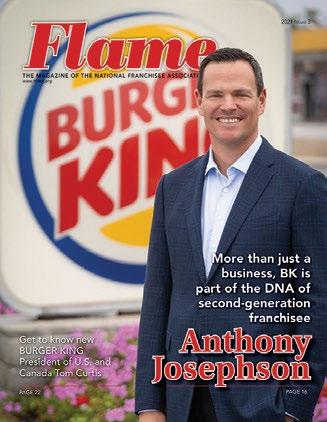




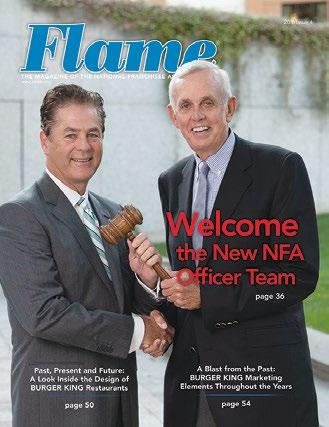









































WITH AUTOMATED OIL MANAGEMENT, TRACKING & ANALYSIS
Optimize your operation using our innovative Total Oil Management (TOM) software that provides customized oil monitoring. Find your ideal filtration cadence, ensure staff are following best practices, and achieve more efficient oil usage.
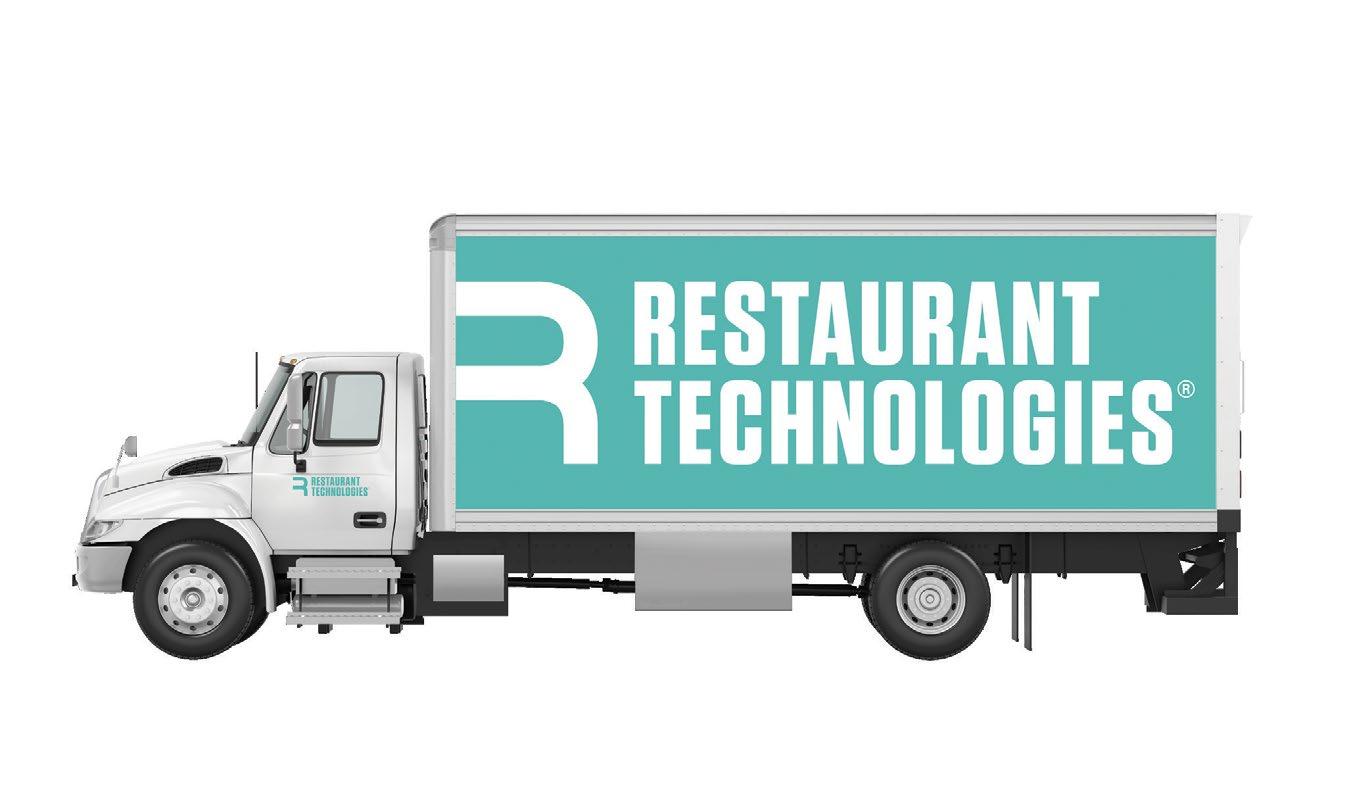



NFA Editorial Board
Rachel Jackson
Editor-in-Chief rachelj@nfabk.org
Allison McCallum
Managing Editor allisonm@nfabk.org
Jared Johnsen Communications Specialist jaredj@nfabk.org
Advertising Sales
Jeff Reynolds
Director of Business
Partner Relations jeffr@nfabk.org
678-797-5163
NFA Officers
Dan Fitzpatrick
Chair
Jim Froio
Vice Chair
Anthony Josephson
Secretary
Steve Keith
Treasurer
Kevin Newell
Second Vice President
Christy Williams
CEO
NFA Board of Directors
CANADIAN
Mike Kitchingman
FLORIDA/CARIBBEAN
Glenn Levins
GREAT MIDWEST
Rich Scanlan
Henry Delouvrier
Mark Peterson
GREAT WESTERN
Nasser Aliabadi
Gary Geiger
INTERNATIONAL HISPANIC
ASSOCIATION
Adam Velarde
LARGE FRANCHISEE GROUP
Tom Garrett
METRO NEW YORK
Sanjay Patel
MID-ATLANTIC
Gary Andrzejewski
MID-SOUTH
Kevin Newell
Mike Callahan
Kevin Fernandez
Larry Stokes
MINORITY
MOUNTAIN
OHIO
Josh Lephart
SOUTHERN
Shirley Humerian
SOUTHWEST
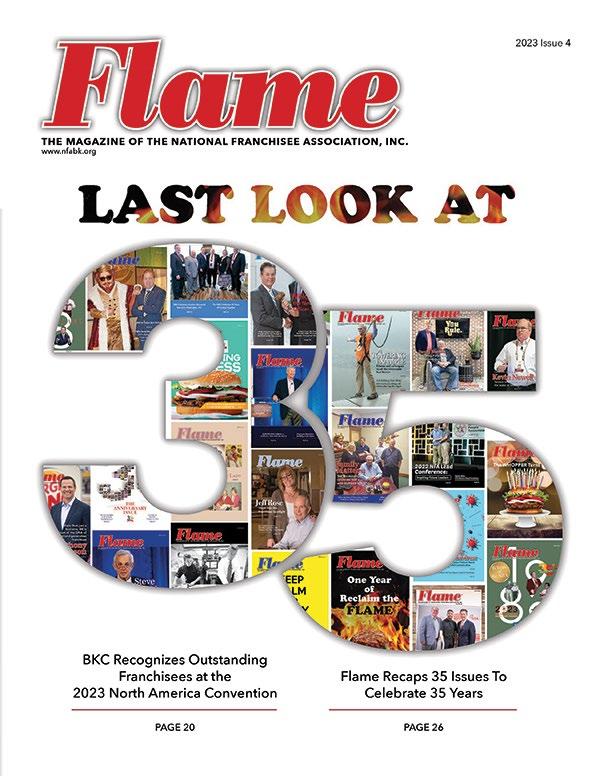
02
04



16 Support the Vendors That Support Your Association
44 Editorial Calendar and Advertisers Guide
18 Chairman Emeritus Spotlight: Julian Josephson
20 2023 BKC Convention Recognizes Annual Award Winners
22 Thank You!
contributed by the BURGER KING FoundationSM
24 Emerging Restaurant Technology – Is It the Solution To the Labor Issue?
by Jared Johnsen, NFA communications specialist
26 Last Look at 35: 35 Flame Covers for 35 Years by Allison McCallum, NFA managing editor
30 Why Email MFA Is Essential for Your Business by Bruce Ahrendt, Restaurant Services Inc.
32 Employer Work Rules Need Review in Light of the National Labor Relations Board’s Strict New Standard by Elizabeth Rice, Laner Muchin
34 True Professionalism: The Core of Service Excellence by Dennis Snow, Snow & Associates Inc.
38 Elements of The Entrepreneurial Mindset Series Element No. 2: Purpose, Path and Plan by Dan Coughlin, The Coughlin Co.
40 Common Employee Injuries and How To Prevent Them contributed by Lockton Cos.
42 It’s Not (Completely) What You Think: “New Age” Management Techniques by Laura Stack, The Productivity Pro®
Happy New Year to all!
I am writing this Chair’s Column for the Flame immediately after the most recent National Franchisee Association (NFA) Board of Directors meeting held in Atlanta. As is customary, near the end of our meetings, each director is given the opportunity to address the entire board, to raise issues of concern, comments, etc.
Notably, one director began his comments with “What a difference a year makes.” Nothing could be more on point or accurate. Indeed, what a difference a year makes. 2023 was surely a remarkable year for the BURGER KING® brand. The brand experienced new highs in sales and restaurant-level cash flow which, of course, were urgently needed in our businesses.
As we closed the book on calendar year 2022, our business prospects were just starting to gain small doses of improving momentum. As 2023 unfolded, sales momentum was sustained, cost inflation moderated, the brand made changes to its marketing approach, and cash flow began to steadily grow throughout the year.
This success, however, must be viewed with a wider lens. We are clearly in a better place than we were 12 months ago, but we need to build on our momentum and achieve much higher levels of success if our brand is going to reach its full potential.

In other words, what we have achieved so far was necessary, but it is not sufficient. All of us working together to operate our restaurants at the highest levels is needed to support the overall and wider brand effort to achieve even greater sales, cash flow and business values for the benefit of our families.
As we bring an end to the 35th year celebration of NFA, we have taken opportunities to celebrate our successes, to thank those who have served our association in positions of leadership in the past, and we look forward with anticipation of more success.
I remind you that NFA is an association of associations. It is in our local associations where franchisees can best serve the interests of our individual businesses. It is also clear that in our individual associations, we have enjoyed the camaraderie and fellowship of each other which have formed the bonds of long-lasting relationships.
Also, it is with great enthusiasm that I share that 2023 was another record year of success for Elevanta, our service organization which, of course, is owned by us as NFA members.
Elevanta’s Board of Directors led by Glenn Levins and our CEO Christy Williams and her team have worked tirelessly to offer services and programs for the benefit of not just our NFA members,


 by DAN FITZPATRICK
by DAN FITZPATRICK
but for over a dozen associations in various businesses across the country. Each and every day, Christy and her team are focused on being the very best provider and partner for their clients. I encourage each of our franchisee members to connect with Elevanta and to evaluate the high-quality nature of offerings that can benefit your business in substantive ways.
I hope that the recently concluded holiday season was one that was shared with family and friends and one that will help form warm memories for years to come. For me, the holiday season is always a time of reflection on the many blessings that I have been given in my life, both personally and professionally. I hope that you are gratified in your life as well.
Know that it is an honor for me to represent NFA as your Chair, and I hope that 2024 will be a year of good health, great success and enjoyment for you and your family.
Indeed, what a difference a year makes!
Dan Fitzpatrick NFA Chair


Happy New Year, NFA members!
Though we are now in 2024, this issue is the last installment of Flame that will celebrate our association’s 35th anniversary. Major changes took place in our BURGER KING® brand and NFA throughout 2023 — many of those being positive. Through highs and lows, we have seen the brand’s resilience for 70 years, and NFA certainly plays a major role in BURGER KING’s continued success.
As one of the most accomplished franchisee associations in the U.S. — and the very first association formed in the QSR sector — NFA can proudly say that our influence has positively impacted the BURGER KING brand for the last 35 years.
Who understands the business better than franchisees and operators who are in restaurants every day? You understand the product, your teams, the real-world operations of a BK® restaurant and how all of those fit together to create the customer experience. Simply put, our NFA community is of great value to the brand.
Many of our members started as BK crew members. NFA’s collective experience in the brand speaks volumes to the importance of the franchisee perspective and the benefits it brings to BURGER KING. Ultimately, the association provides consistency for franchisees in the BK system, and it brings significant value to your investment.
NFA and its wholly owned subsidiary Elevanta have innovated the way associations are managed and how we can offer member services. It was through the hard work and dedication of NFA members that Elevanta was created and can now serve other associations through our management strategies and suite of services. As a professional services firm, Elevanta’s primary goal is to help businesses succeed by providing the tools necessary to thrive. Many of our services were inspired by the needs of NFA members and have adapted over the years as the industry has changed.
Even in the BURGER KING
community, NFA continues to bring forth ideas that help the entire system. In 2018, we created the CORE program in response to the need for a training program for all levels of leaders and managers. The inception of CORE highlighted a gap in BURGER KING training and led to the development of the first in-person conference designed for your above restaurant leaders (ARLs), the NFA Leadership, Exploration and Development (LEAD) Conference. Due to the overwhelming response from members and your ARLs, the LEAD Conference joined our lineup of annual events.
We are in the process of planning our fifth LEAD Conference, June 3-6, in Nashville, Tennessee, and the committee is hard at work putting together the best content for you and your ARLs. I’m excited to share that we have quite a few leadership and productivity experts joining us this year, and the content promises to bring a lot of value to your restaurants. I can’t wait to see how this year’s conference helps your leaders in contributing to your operations. As the LEAD Conference continues to grow, we are planning ahead and looking at strategic partnerships, so we can continue to provide the best content.
The importance of associations like NFA can’t be overstated. There is no better representative for BURGER KING franchisees than the franchisees themselves. As a collective, your influence is much more powerful than anyone acting alone. NFA provides a voice and platform that works for franchisees of all sizes and regions, and without the association, many franchisees and operators would be left without a seat at the table.
NFA is fortunate to have a good position with our franchisor in recent years, but some of you may remember times that were uncertain and, frankly, a little scary. When your livelihood is threatened, and you have no way to protect yourself from the franchisor, you feel powerless and
 by CHRISTY WILLIAMS
by CHRISTY WILLIAMS
unprotected. Our longtime members will recall the many times NFA has stepped in to protect BURGER KING franchisees.
One of the biggest accomplishments in our association’s history is Project Champion, where NFA’s officer team, led by Steve Lewis and Julian Josephson, sought new ownership of the brand. International conglomerate Diageo had acquired BURGER KING, and franchisees wanted a parent company that valued the brand, rather than viewing it as another small part of their portfolio. Over the course of two years, NFA officers successfully found new ownership and completed the deal. An undertaking like Project Champion was virtually unheard of, but franchisee leadership made it a reality.
That’s just one example of how NFA advocates for you and the BURGER KING brand. The association gives you the power to determine the course of your business and protection should you ever need it. It’s a privilege to work with the BK franchisee community. Together, NFA members will continue to inspire greatness for BURGER KING! n
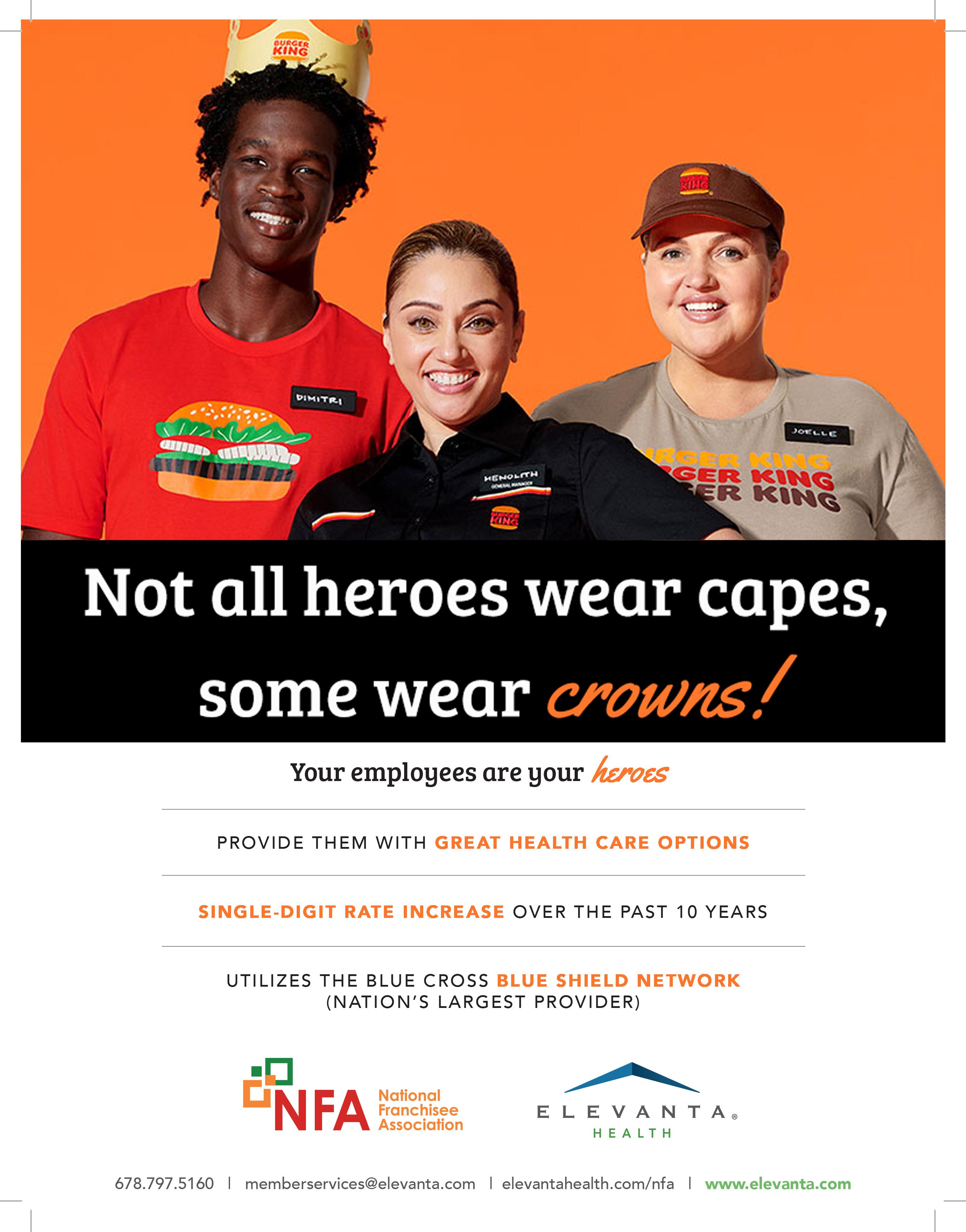




This past November, leaders from Rackson Restaurants met for the 2023 Rackson Summit, the company's first in-person leadership summit since the onset of COVID-19 in 2020. About 35 leaders from various departments across Rackson came together to talk about Rackson’s ongoing goals and initiatives, as well as how the many new employees at the company may use their previous experiences and knowledge to contribute to Rackson's success.
"This event was meant to align everyone with the goals of the business," said franchisee Chris Johnson, "and it was meant to show everyone that the company's initiatives require all hands on deck."
Overall, Rackson employs over 1,500 dedicated individuals in retail, food production, management, maintenance and administrative positions. Their goals include supporting a positive workplace environment and continuing to grow as a trusted operating company, and they have grown considerably by welcoming new talented employees. Since its founding in 2013, Rackson has operated BURGER KING® locations in the states of Connecticut, New York, New Jersey, Pennsylvania, Ohio, Maryland and Delaware.
At their 2023 Summit, employees engaged in several team-building exercises and fun activities that allowed them to


bond with colleagues across different departments. They were also able to enjoy a meal together at Catherine Lombardi, an Italian restaurant in New Brunswick, New Jersey. Team members felt that the event helped them understand exactly how they can contribute their effort to the goals the company has set for 2024, as well as how they can move forward as an even more united company. n
BURGER KING® has named GPS Hospitality its Developer of the Year at the 2023 BURGER KING North America Franchisee Convention. The Atlanta-based hospitality company was recognized for its operations scorecard and development initiatives for the BURGER KING brand, including 22 remodels and new restaurant openings in 2023.
“The GPS team set out to achieve very ambitious goals this year with several high-quality remodels and openings as part of our Reclaim the Flame plan, and we’re proud of the progress they’ve made,” said Eduardo Serafim, vice president of development for BURGER KING North America. “They’ve done an incredible job investing in their restaurants and demonstrating a clear commitment to the future success of the BURGER KING brand.”
GPS Hospitality, which operates more than 400 BK® restaurants in 13 states, has remodeled nearly 200 and built almost 50 new restaurants over the past 11 years. As part of its efforts, GPS Hospitality worked with the BURGER KING development and design team on its new “Sizzle” design, a prototype featuring warm and inviting décor providing a modern feel, digital improvements and an enhanced guest experience. The new design has been launched in Marion, North Carolina, and Las Vegas. As a member of the image committee, GPS plans to build a refined version of the “Sizzle” prototype design in Dunwoody, Georgia, in 2024, with the support of the City of Dunwoody and local homeowners. GPS will build its first 60-seat Sizzle in its hometown next year.
“GPS Hospitality is honored to be recognized as the BURGER KING Developer of the Year,” GPS Hospitality CEO

and Founder, Tom Garrett, said. “We are proud of our continued dedication to building and remodeling high-quality restaurants for our team and the communities we serve and that we can represent both GPS Hospitality and the BURGER KING brand with the very highest standards.”
The Developer of the Year award underscores GPS Hospitality's position as a franchisee committed to supporting the BURGER KING reimaging strategy. n
The GPS Hospitality Support Center, which began partnering with the Atlanta Mission by sponsoring the shelter’s annual 5K run every February since 2017, continued to foster its relationship with the non-profit throughout 2023. GPS Hospitality staff volunteered on-site several times at various facilities run by the Atlanta Mission, including serving lunches at My Sister’s House, a women’s and children’s shelter, and The Shepherd’s Inn, a men’s shelter.
The Restoration House is the newest facility overseen by the Atlanta Mission that opened its doors in Fall of 2021 to women and children seeking shelter. GPS Hospitality staff helped organize clothing closets at the facility twice in 2023, as volunteers were needed to arrange the racks and shelves of donated clothing available to facility guests.
“We wanted to help the women have a nice place to go to pick out clothing items for themselves and their children,” said Lisa Grier, GPS Hospitality director of communications, “so that was a nice new addition to our rotation of volunteer opportunities.”
The Atlanta Mission also aims to hold birthday celebrations for guests at their facilities, and GPS staff collected birthday party supplies to provide for such events. They also collected daily essentials for kits to be provided to facility guests, including towels, shower shoes, shampoo, shaving tools, body wash and more.
“We really wanted our Support Center teams to have an opportunity to engage with the local community,” Grier said about the importance of GPS’ relationship with the non-profit. “Finding the Atlanta Mission has just been very impactful for our employees to find a way to be able to help the homeless population in our hometown.”
The GPS Hospitality staff plans to continue to rally behind the opportunity to provide for members of their community by working with the Atlanta Mission throughout 2024. n

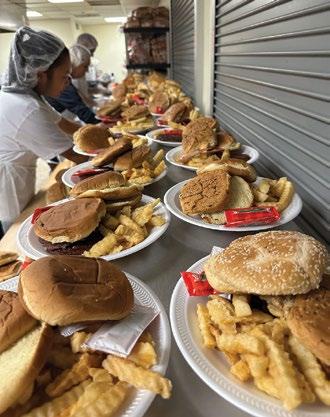
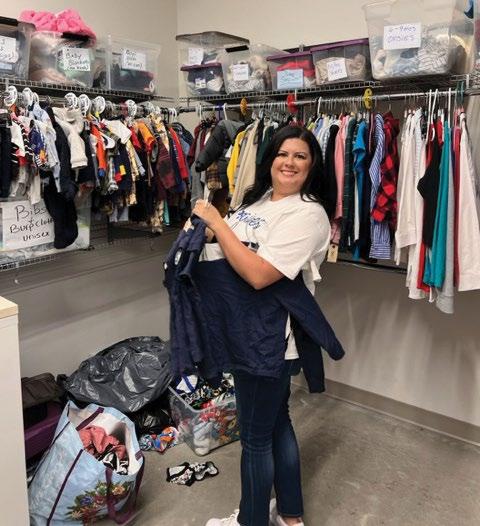
In November 2023, BURGER KING® franchise
JSC Management Group took their grills to the gravel as they participated in the Medina Parade of Lights in Medina, New York.

Strolling alongside other local businesses, the Medina BURGER KING’s float featured The King serving his famous Flame-grilled WHOPPERs® to other fast-food icons, Ronald McDonald and Wendy. Also dazzled
with burger- and Flame-shaped lights and dancing fries and burgers around the float, the display was named grand champion of the parade.
Not only did the float wow the parade committee, but it also gifted parade spectators that were handed 500 fresh (non-float cooked) double cheeseburgers by employees.
“Participation in this parade took 30 people to plan and execute, and it was exciting to see staff get fired up about this,” Nicoletta Cammilleri, JSC Management marketing director said. “This was more of an employee bonding exercise than anything.”
Now, with a parade float they can utilize, JSC Management Group hopes to participate in more parades in its respective communities. n

Wyatt Batchelor, Managing Partner at MBN Brands, visited Capitol Hill in October 2023 to meet with legislators and discuss the impacts U.S. laws currently have on the experiences of franchisees. As the co-founder of Front Range Holdings, a 58-unit BURGER KING® operator, Batchelor gained first-hand experience in being responsible for the development, sales growth and operations in his region’s restaurants.
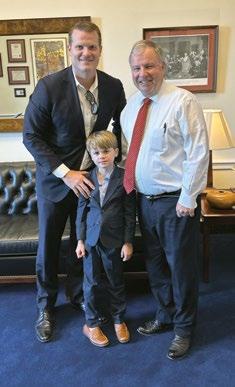
Intermediaries at Restaurant Brands International requested meetings between Batchelor and legislators, who are more than willing to make time in their schedules to meet with franchisees. Many lawmakers understand that franchisees across the country represent a sizable amount of their constituency and are impacted every day by the decisions made on Capitol Hill — and it’s only right that their voices be heard.
Batchelor and his family took the trip to Washington, D.C., where he and his son were able to enjoy a tour of the Capitol building. Batchelor met separately with two legislators in their offices: Kevin Hern, representative for Oklahoma’s 1st congressional district, and Doug Lamborn, representative for Colorado’s 5th congressional district. Both
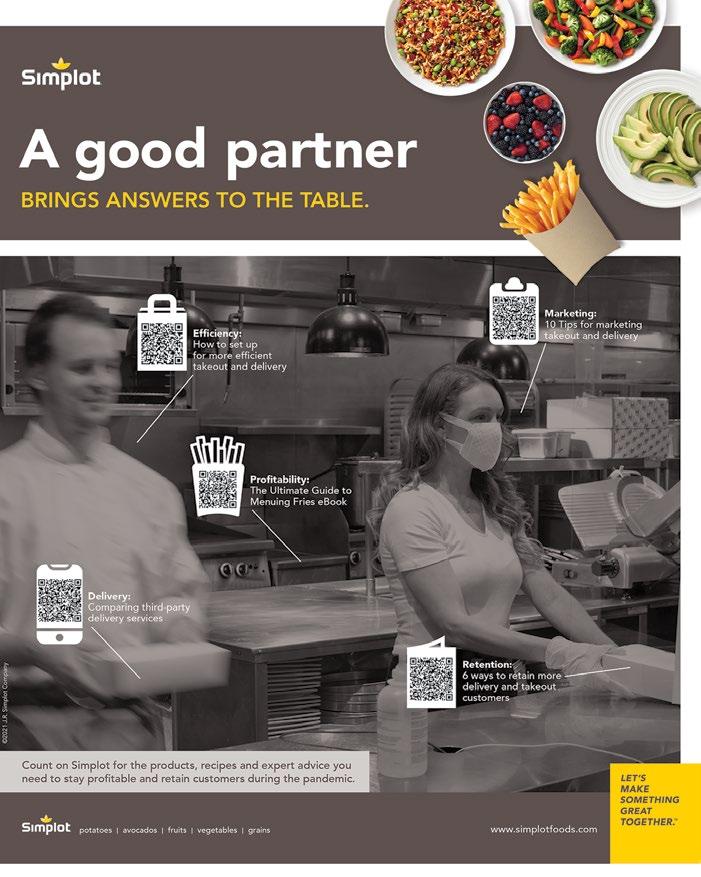

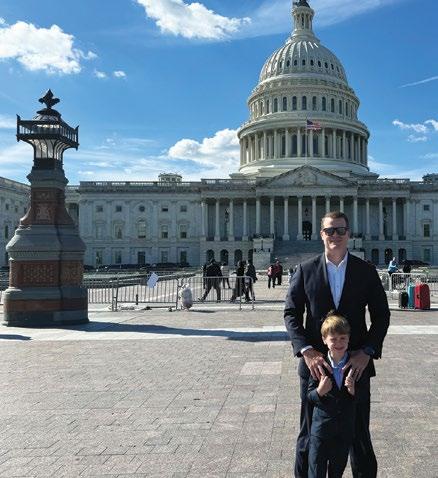






representatives approached the meetings with an understanding of the experiences of franchisees. Rep. Hern is a former McDonald’s franchisee, and Rep. Lamborn hails from Colorado where MBN Brands owns and operates several BURGER KING restaurants.
In these meetings, Batchelor and the representatives discussed current policies that impact franchisees and other restaurant workers across the country, such as the Earned Income Tax Credit (EITC), which helps low- to moderate-income workers and families get a tax break. Research shows that families mostly use the EITC to pay for necessities such as food and housing, and in some cases, for education or training to boost their job prospects and earning potential. Meeting with legislators to ensure that policies like the EITC remain available for those who need them ultimately stands to benefit a vast number of franchisees and crew members at restaurants across the country. It is imperative that people understand their power as constituents and exercise their right to participate in the legal processes that directly impact their day-to-day lives.
“The bottom line is that it’s what’s best for the country,” Batchelor said about the importance of constituents meeting with U.S. lawmakers. “Both representatives were more than willing to assist with these bills and to have discussions with other lawmakers to ensure that they get passed, so I’d say they were successful meetings!”
After reflecting on the outcome of the discussions he had on Capitol Hill, Batchelor expressed why he feels it is essential to the success of franchisees that they stay informed about U.S. policy and aim to foster relationships with those who represent them and their interests.
“By taking the time to go out of our way to meet with various lawmakers, we’re demonstrating our commitment to the business. As franchisees, we should conceptually understand the importance of legislation and, when able, take the time to reach out to our representatives, whether they’re at the local or federal level,” he finished. “These various interactions we have, all together, do impact how legislators perceive bills and overall is positive for businesses across the country.” n
Metro New York Franchisee Association (MNYFA) held its annual meeting on Nov. 8-9, at The Borgata Hotel in Atlantic City, New Jersey. The two-day event featured updates and informational sessions from National Franchisee Association (NFA), BURGER KING® Corp., Restaurant Services Inc. (RSI) and vendor partners. Franchisees were invited to attend the trade show, allowing them to network with other franchisees and vendors who work with NFA.
“The meeting was very successful and even exceeded its vendor goal. Many attendees gave high regards to the food and location!”
– Olivia Edwards, NFA senior meetings and events manager

The first day of the meeting began with opening remarks from Sanjay Patel as he addressed members as the MNYFA regional president for the first time.
General session included updates from NFA Chair Dan Fitzpatrick and RSI CEO Joel Neikirk. The day concluded with a lively trade show, reception and dinner.
The second day featured important sessions closed to franchisees only, with updates from BURGER KING Corp. and Mike De Rosa speaking on behalf of the Veterans of Foreign Wars Foundation.
This meeting included presentations from vendor partners, displaying the benefits of their products and services. Thank you to all the vendor partners who spoke and supported MNYFA: Budderfly, Ecolab, Entera Branding, Keurig Dr Pepper, Lineage Logistics, PARTech, Restaurant Technologies and The Coca-Cola Co.
“The meeting was very successful and even exceeded its vendor goal,” Olivia Edwards, NFA senior meetings and events manager, said. “Many attendees gave high regards to the food and location!” n
March 19
Mountain Franchisee Association Meeting
The Capital Grille Denver, Colorado
March 20
Southwest Franchisee Association Meeting
Arizona Restaurant Association
Phoenix, Arizona
March 25-27
Ohio River Coalition, Mid-Atlantic Franchisee Association and Great Midwest Coalition Joint Winter Meeting
Omni Grove Park Inn
Asheville, North Carolina
National Events
March 5
NFA Board Meeting
The Royal Sonesta Washington, D.C.
March 5-7
2024 NFA Day on the Hill The Royal Sonesta Washington, D.C.
June 3-6
2024 NFA LEAD Conference
Grand Hyatt Nashville Nashville, Tennessee




Inearly October 2023, six BURGER KING® team members from stores across North America came together at BURGER KING Corp.’s annual North America Franchisee Convention in Miami, Florida, to show off their WHOPPER®-building skills. The six team members entered the “WHOPPER Challenge,” a competition in which participants are tasked with creating a classic WHOPPER sandwich, as well as three customized WHOPPER sandwiches within three minutes, in order to claim the title of WHOPPER Challenge Champion — and acknowledgement as 2023’s best WHOPPER maker in North America. The contestants’ performance was assessed based on several factors, including their speed and accuracy, as well as the temperature, weight and overall presentation of the sandwiches they made.
Heather Gear, team member at BURGER KING No. 3359 in Oregon, Ohio, sent a video submission in July of 2023 to be

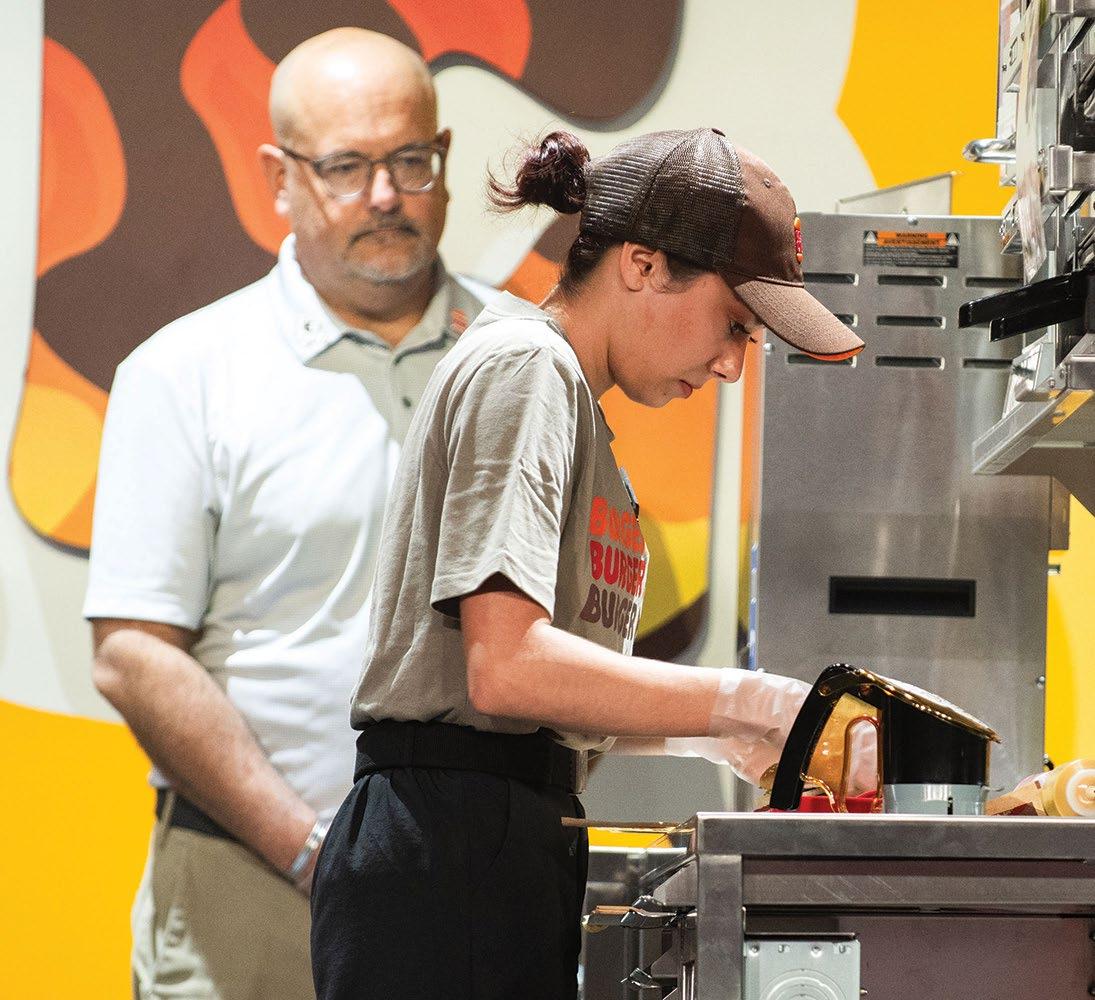
Canada, to become one of the six contestants on the big stage at the convention in Miami.
Gear ultimately came out on top as her WHOPPERs lived up to the “Gold Standard” used to measure the quality of service that BURGER KING aims to deliver to customers. After acting and modeling when she was younger, Gear explained that she had little fear competing in front of the large audience at the convention. She remained calm and reminded herself that she was doing something she’d done countless times before. Following her win, she had a televised interview with WTOL 11, a news station based in Toledo, Ohio, in which she demonstrated how a WHOPPER must be made patiently and with the right ingredients and build so that it can be served hot and fresh for the customer.
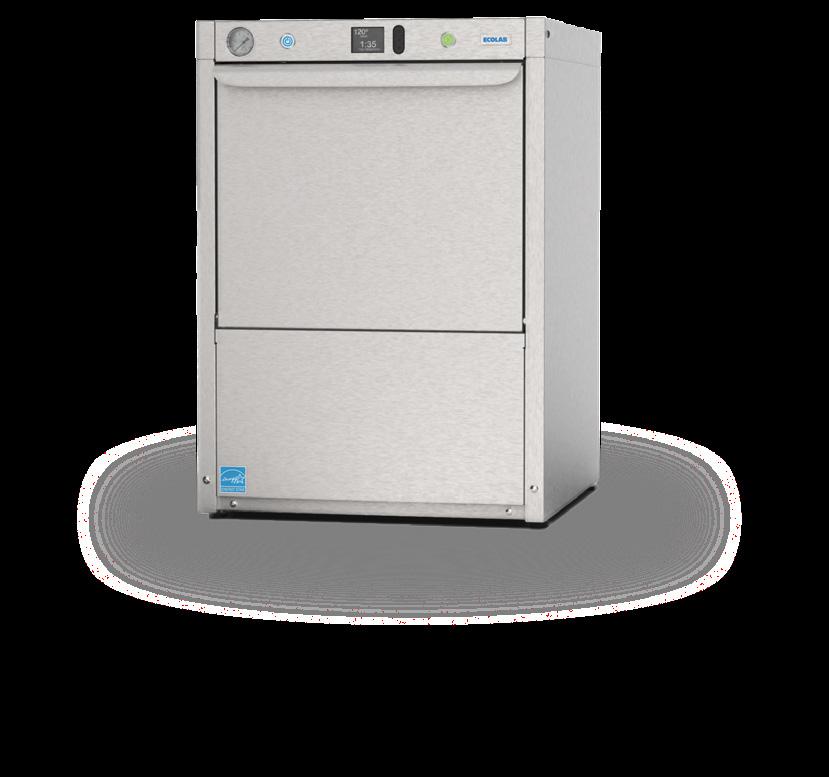
“It took a long while for it to sink in,” Gear said about learning that she had become the newest WHOPPER Challenge Champion. The prize for the year’s champion was a Golden WHOPPER Trophy and a generous check for $10,000, which Gear plans to put towards her upcoming wedding — at which the groom will be a fellow former WHOPPER Challenge contestant.
“It’s very special to me because the only reason I sent in a submission for the WHOPPER Challenge is because my fiancé did it before, and I wanted to make it farther than he did,” Gear laughed. “I’m very happy to share this accomplishment with my fiancé and for us to be able to have the wedding of our dreams.” n
MARCH



MARCH

MARCH

MARCH

MARCH

JUNE

JUNE

JULY

JULY

Company Name: Snake River Foods
Partner(s): Ted Nunamaker, Sarah Bailey and Dr. Elizabeth Nunamaker
Year You Became a BK® Franchisee: 2023
Number of Restaurants: Five, soon to be seven State(s) Your Restaurants Operate In: Idaho and Montana
How did you become a BURGER KING® franchisee? I was born into the BURGER KING family with my father Jon Nunamaker and my late uncle Tom Nunamaker becoming franchisees in 1978.
If you have business partners, how did you meet? My business partners are my cousins, Ted and Sarah, and my sister Elizabeth.


Tell us a little about yourself and the company’s background. The second generations started becoming more involved in 2019. We were managing operations as our fathers were heading into retirement. In 2020, I relocated to Idaho from Oregon to work full time overseeing our two Idaho stores. In early 2023, Ted and I officially became franchisees and bought our fathers out of the operations side.
In your opinion, what stands out about the BURGER KING brand? Flame broiled, all-beef patties!
Going forward, what are your top three business goals for your company? Increasing traffic by improving the guest experience. Cultivating leaders from within. Maintaining our A operator status.
What is the best piece of business advice you have received? Always be kind.
What do you feel is the biggest challenge currently facing franchisees? Winning back our customers. We have to get them back in the doors and regain their trust in our brand.
What is the biggest industry change since you started? Reclaim the Flame. The new Branding of You Rule!
Tell us about your family. My family is two generations deep into the brand. We’re here to set goals, focus and execute.
Tell us about your personal interests. I’m a cowgirl at heart with a fine arts degree and a long career in hospitality. Interior design, ceramics and dragon boat racing are some of my hobbies.
Complete this sentence. If I weren’t a franchisee, I would be … Running a horse rescue and an interior design business. n
Every year brings its own set off obstacles to overcome, goals to meet and trends to watch. 2022 brought a slew of unforeseen circumstances to you and your business, such as supply chain issues, inflation and supply shortages. Leave the guess work to us to predict the trends in 2023 that will keep you as a business owner on your toes and ready to tackle the new year.
6 A heavier reliance on automation is at the forefront of combatting the rising costs seen in 2022. It is predicted that 53% of tasks can be automated.
1Regardless of inflated prices and other financial stressors, 84% of consumers would rather utilize their free time by dining out to avoid cooking and cleaning.
1Now more than ever, consumers are purchasing items with sustainability in mind. Much so, a little over 75% of them have been attempting to buy more environmentally friendly products.
2 As a matter of fact, 65% of Americans eat out at least once a week, and 37% make restaurant trips daily.
2 A company’s sustainable initiatives or actions toward a cause could build a loyal customer base. A whopping 88% of customers support companies that support social or environmental issues.
3 Consumers are still very determined to dine out, even with menu prices rising 40% higher compared to pre-COVID-19 pandemic numbers.
3 TikTok, a once up-and-coming social media platform, now has over one-billion active users. Marketing your business on TikTok may be in your best interest with over 84% of consumers admitting to buying a product after watching a video advertising its use.
4 What is driving consumers to restaurants even with economic challenges? Everyone wants to be on top of the latest trend. Actually, 72% of consumers say they are excited to try the latest fads to “see what the hype is about,” and 67% want to see even more trend participation from restaurants.
4 Who are the people selling these products? Influencers. Franchise owners are aware of their low cost and influence in certain markets with 25% of small-business owners utilizing them for marketing campaigns.
5 Among those trends are nostalgic foods or cuisine “from when times were simpler.” Around 72% of consumers enjoy foods that remind them of a previous time.
5 Individuals in Generation Z are stepping up as active participants in the economy. With the oldest of this generation being 24 years old, they, now more than ever, have an influence on the economy.
7 With automation comes artificial intelligence (AI). AI is becoming more advanced and will continue to develop as the need for human work decreases. Companies are already exploring this technology, as 25% of U.S. businesses are utilizing this, and 43% of those entities are exploring it.
6 With diners returning to work on-site, they have been more motivated to dine alone, with 7% more people making solo restaurant trips year over year.
7 Even though customers are returning to physical locations, hybrid and remote work is here to stay. Across the entire foodservice industry, lunch traffic has consistently decreased by 20%.
8 As a business owner, you are one person trying to be in multiple places at once. It is key to have tools that allow you to monitor your business from afar to ensure your efforts are being put in the right place. Other entrepreneurs agree, and 19% of small businesses feel that investing in new technology is worth it.
8 What will also decrease in 2024 is the number of people dining inside restaurants compared to using the drive-thru, picking up or using food delivery. Dine-in traffic has been down 50% since 2019.
9 Eighty percent of U.S. small businesses are not correctly utilizing advanced digital tools which can be detrimental to multiple parts of your business.
9 To prepare themselves for the year, 55% of operators are improving customer traffic in 2024 by providing more consistent menu execution and improved team engagement.
10 All-in-all, this is the year to build up your business or get it out of a rut. With 66% of small-business owners predicting revenue increases, 2023 is going to be a year of prosperity and growth!
10 How are restaurant owners planning to combat the labor shortage? About 58% of them hope to implement some sort of automation or tech into their operations.
*Note: This is a compilation of web articles strictly for engaging your thoughts, and NFA had no hand in making such predictions.
Sources: Small Business Currents, Melanie Edwards, Ken Marshall, Incfile, Forbes, IBM, Finances Online, Visual Objects, Business.com, Deloitte
Sources: AF & Co., Carbonate, Datassential, Hi Auto, Kinetic12, Mintel, National Restaurant Association, QSR Magazine, Revenue Management Solutions and Toast Tab

Look, Listen, Read is a quarterly compilation of some of the most highly rated and reviewed apps, podcasts, books, websites and other resources. NFA does not support or endorse the use of these tools, which merely serve as a guide to exploring a new level of knowledge and productivity for your business.
1

Improve your franchise relationships and change your life through “Profitable Partnerships.” Author Greg Nathan shares practical ideas, checklists and inspirational stories that will help you secure a bright future in this dynamic franchising industry.
2


With Resource Guru, you can keep your projects on track and your team stress-free. This project management tool gives you the ability to see your calendar in one place, create and edit bookings, as well as resolve scheduling problems on the fly.
3

“How do I find and choose the right franchise opportunity?” “How do I overcome obstacles and bounce back from setbacks?” In the “Stars of Franchising” podcast, you’ll learn from hosts Ab Igram and Vini Onyemah, along with global pioneers, innovators and visionaries who are realizing their entrepreneurial dreams through the franchise business model.
4

The allure of entrepreneurship is undeniable, but the high start-up costs and fear of failure may make some hesitant to take the plunge. In “The Franchisee Lifestyle,” author Adam Goldman presents a compelling case for why franchising might be the ideal solution for aspiring business owners. Building a successful business from the ground up is undoubtedly challenging. However, with the guidance and support of a well-established franchise, your chances of thriving in the competitive market significantly increase.
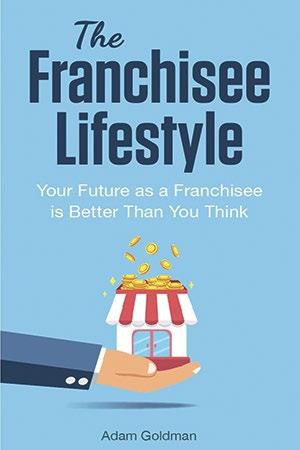

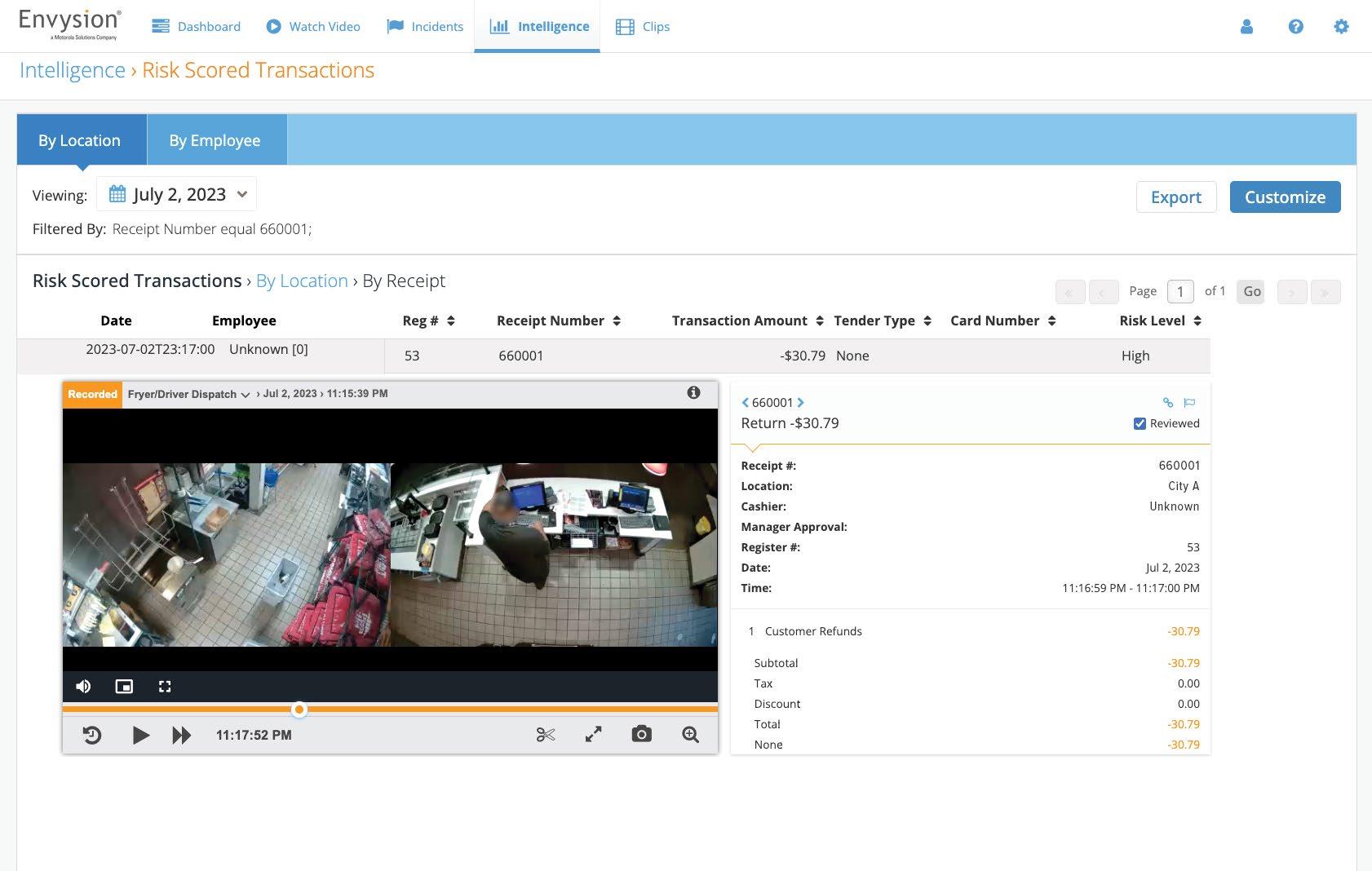

5 Insights and data assist everyone from first-time franchise buyers and seasoned investors in making informed decisions. With weekly interviews from franchise leaders and franchise analysts, the “Franchise Findings” podcast, hosted by Patrick Findaro, will become your go-to source for vetted franchise information.
6

Quickly see the status of and track progress on collaborated projects with Kanban Flow. Assign tasks and check the status of upcoming or in-progress items with ease. The Kanban Flow app is designed to boost productivity by employing the Pomodoro timer.
7

Discover the winning patterns of successful businesses and apply them to your own startup in “Start. Scale. Exit. Repeat: Serial Entrepreneur’s Secrets.” Get inside the minds of over 30 experts, authors and seasoned entrepreneurs and learn from their hard-earned lessons.
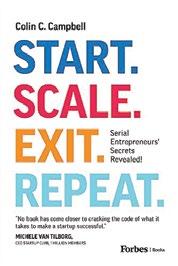

In the “How of Business – How To Start, Run and Grow a Small Business” podcast, host Henry Lopez shares actionable advice, tips and techniques on how to start (including launching or buying your first small business), run and grow your small business. In each episode, you can listen in on different business topics or interviews with small-business owners.


The Buffer app has everything you need to grow and engage your audience to help you get the results you deserve. Buffer is designed to manage social network accounts by providing the mechanics to schedule posts and analyze activity.


The “This Is Small Business” podcast explores the pathway to success for small-business owners by diving into what other owners and industry experts have faced and overcome. Learn about trends, lessons and look at issues from different perspectives to find the tools you need to start, build and grow your small business. n






QHow did you first get involved with the BURGER KING® brand?
We made the decision as a family to emigrate from South Africa to the U.S. in 1976. We made about six or seven trips to the U.S. in between 1976 and 1978 to look at the BURGER KING business and the various packages they had for sale. We made the determination that San Diego offered the best opportunities, so we all arrived here in the summer of 1978.
I recall visiting in February of 1977, having landed in New York. It was a bitter cold winter there, with snow and everything, but San Diego was nothing like that. I spoke to a real estate agent there, and as I was standing with my back to the ocean in one of the coastal areas, I said to him, “This is magnificent. I mean, this is February!”
He said, “Well, it's one of the five best places in the world to live.”
I said, “Well, that’s certitude; you say that with such confidence! What are the other four places?” and he said, “Who cares?”
I thought, Y’know what? We're coming to San Diego! So, that's where we moved. We bought the stores here, and that was the beginning of the journey.
QWhat was your career path to becoming a franchisee?
I bought into the business as a franchisee, with my brother-in-law Stan Smiedt. He was a well-known franchisee, and he passed away in December of 2021.
Q Do you still have involvement with the brand?
We've turned it into a family business, which is wonderful. My brother-in-law and I decided about five or six years ago to dial back our involvement, because we not only owned BURGER KING restaurants — we own real estate, Popeyes locations, and we had Pacific Bagels. We'd been working in the business for 30 to 40 years but decided we needed to pass it on to the next generation. Most of us in the family have still retained interest in the business — but my brother-in-law's two sons have gone off in different career paths, and I have a

daughter who wasn't interested. My son, Anthony Josephson, expressed his interest, and he has done a fantastic job for us.
I said, "Son, are you sure?" and he said, "Dad, I'm up for it."
I said, "The United States Navy SEALs who practice and work in San Diego have a saying: 'The only good day was yesterday.' I just want you to remember that it can be a tough business."
He's done things that I could never have imagined. I have great pride in his achievements. In fact, he is doing a much better job than I or my partner could ever have done. He has youth on his side — for which, I'm jealous. We've entrusted the whole business to him. The family is very happy with the way it's progressed. We're still intimately involved with the business, though we don't work directly in it anymore. From time to time, we'll have meetings where Anthony will bring us up to speed on what’s happening.
QHow did you hear about National Franchisee Association (NFA)?
I knew many of the guys who started the association. Some of them were from California. I wasn't involved in the formation, but they saw a need for an independent association to represent the interests of the franchisees. I very soon became a firm believer in what they were trying to do. I watched as they began to assemble the franchisees around the country, and I was very interested in the work they were doing. We've remained engaged members ever since the late 80s. Obviously, we joined as soon as we could. That was the inception of our involvement in the franchisee association.
QWhy did you decide to join the association?
Again, I really believed in what they were trying to do, as I do to this day. When you come into something, like NFA, that's been well established for almost 40 years, it’s easy to take it for granted. That's just human nature. The association is like a hospital; you drive by it every day, in your city or in your neighborhood, and you never give it another thought, until, God forbid, the day you need it. If you took away the association, it would be a catastrophe.
QWhat was your path to becoming chair? Did any significant events happen during your term(s)?
Very soon after I came into the system, around the time of the formation of NFA, I became friendly with Steve Lewis and Dan Fitzpatrick, notwithstanding the fact that they lived on the other side of the country. These guys seemed to be very smart and talented, and we became very close friends. We’ve attended each other's family functions, watched each other's kids get married. Before I became chair, I served as the Marketing Advisory Council chair when Paul Clayton was the president of BURGER KING Corp. It was very interesting trying to get everybody on the same page, and everyone had a different view of how the brand should be marketed, but I really did enjoy my time as the MAC chair.
Somehow, I became the vice chair of the association. I have no idea how that happened; one day, I wasn't, and then the next day, I was! This was in the early 2000s, when Steve Lewis was the chair of the association.
At that time, decisions were being made at NFA that we needed to have BURGER KING separate itself from Diageo, the parent company that was based in London. Steve and the executives of NFA, including myself, decided that we would be best under different stewardship, and that we needed to find somebody else to own this humongous brand. Steve, myself, Dan and others reached out to multiple private equity companies, such as Texas Pacific Group (TPG). We traveled around the country explaining to these companies that we felt ownership of the brand should be in the U.S. and with someone who looked upon us as a valuable part of their organization. We “wooed” TPG, and they displayed interest and had the money to buy the entire brand. Not all of the franchisees were supportive from day one, as they were mostly concerned with local events and going to the conventions and weren’t sure what we were trying to do. We traveled around the country going to various regional association meetings, carefully explaining to the franchisees why it was important for them to have an interest in committed ownership of the brand.
QWhat is your favorite memory of being a part of NFA?
The day that the deal was consummated between TPG and Diageo, where TPG took control and ownership of the BURGER KING brand. Mission accomplished! That was definitely a highlight.
QHow did NFA change your career?
Well, it's the only career I've ever had. I came here as a young man, and I left as an old man. I think perhaps a better question would be: “Would you have preferred another career?” And, to that, I'd give you a resounding “No!” My family was coming from a poor country to the U.S., the greatest country on Earth. We liked the business — my brother-in-law, myself and parents — and we spoke English, but not exactly the same as everyone else. With our different accents, we had to figure things out, but it was a relatively simple business: work hard, pay attention, take care of the customer, and you'll be okay. When I look back on it now, it was difficult at times — even frustrating at times — but always enjoyable. I can't speak for someone who was born in this country, but as someone immigrating to this country, we couldn't have wished for something better! n
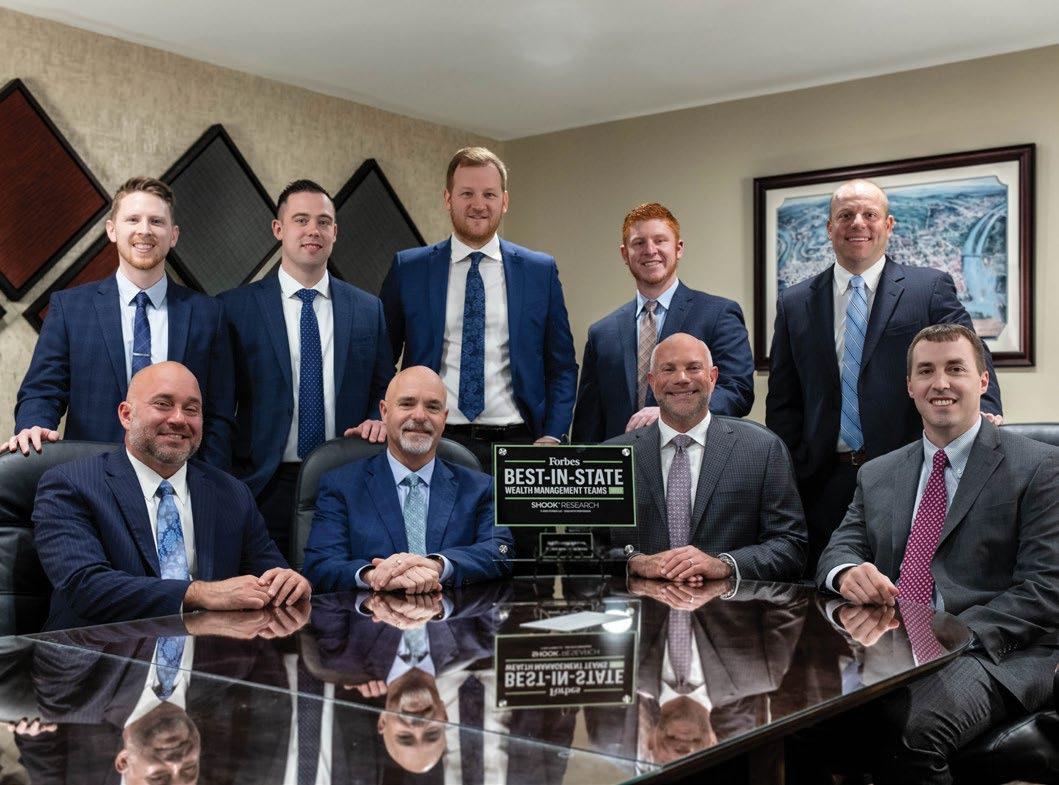


On Oct. 3-5, BURGER KING® Corp. hosted its 2023 BURGER KING Convention where the company welcomed franchisees, suppliers and corporate staff members from all over the globe to the Miami Beach Convention Center in Miami, Florida, to update and rally the BURGER KING community.
The convention recognized suppliers and franchisees with awards for their overall performance, development and other initiatives. Some categories included Developer of the Year, Franchisee Excellence, King of Giving, Royal League Winners and many more.
Many National Franchisee Association (NFA) members were recognized for their hard work, community service and achievements. Read on for more information about these NFA members and recipients of BURGER KING Convention awards.
Jamie Naill, 3rd place, 1-5 category
Terry Piotrowski, 3rd place, 6-10 category
Wayne Burke, 3rd place, 50+ category
Tom Cardarelli, 2nd place, 1-5 category
Richard Conely, 2nd place, 6-19 category
Larry Kohler, 2nd place, 20-49 category
Sanjay Patel, 2nd place, 50+ category
Bruce Pavlikowski, 1st place, 1-5 category
Gary Edwards, 1st place, 6-19 category
Michael DiSeveria, 1st place, 20-49 category
Sunny and Harsh Ghai, 1st place, 50+ category
Harvinder Singh,1st place, Non-Traditional category
Development Awards
GPS Hospitality, Developer of the Year
Carrols Restaurant Group, Opening of the Year
King of Giving Award
Tom McDonald
Royal League
Sanjay Patel, BK No. 25989, 3rd Place
Chris Johnson, BK No. 22482, 1st Place

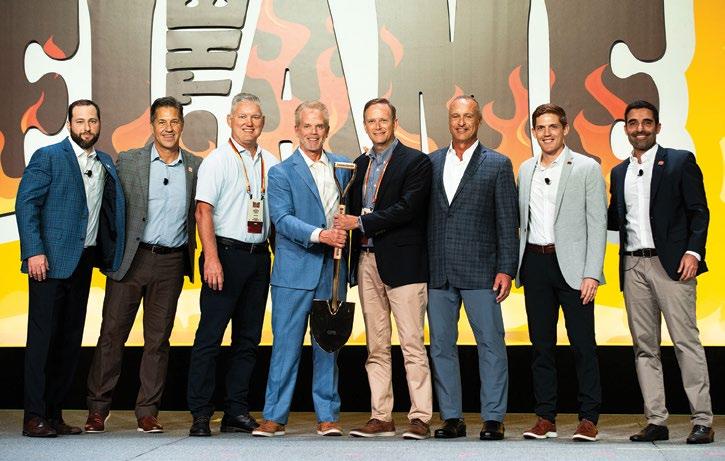
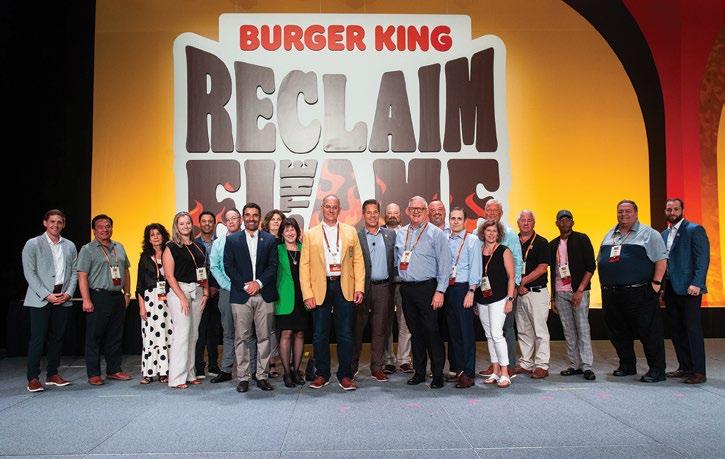
 Tom Garrett (center) of GPS Hospitality received the award for the Developer of the Year from members of BK corporate.
Carrols Restaurant Group accepted the Opening of the Year award for 2023.
Bruce Pavlikowski (center) of Sheehy Enterprises received the Franchisee Excellence, 1-5 Category award from members of BK corporate.
Tom Garrett (center) of GPS Hospitality received the award for the Developer of the Year from members of BK corporate.
Carrols Restaurant Group accepted the Opening of the Year award for 2023.
Bruce Pavlikowski (center) of Sheehy Enterprises received the Franchisee Excellence, 1-5 Category award from members of BK corporate.


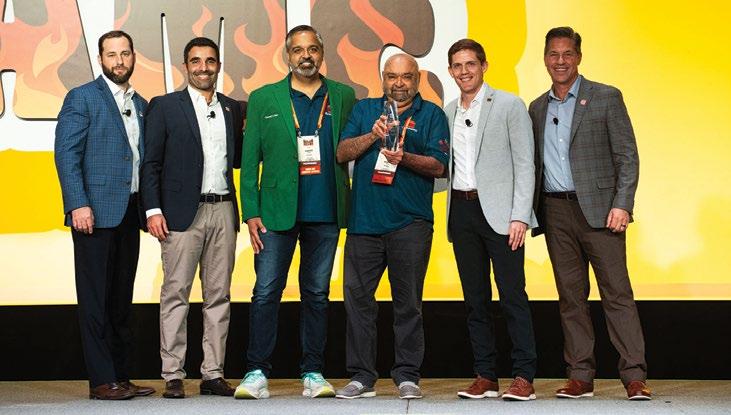
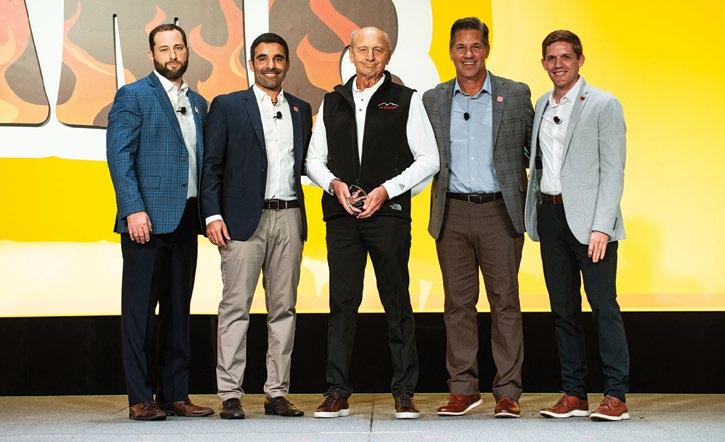
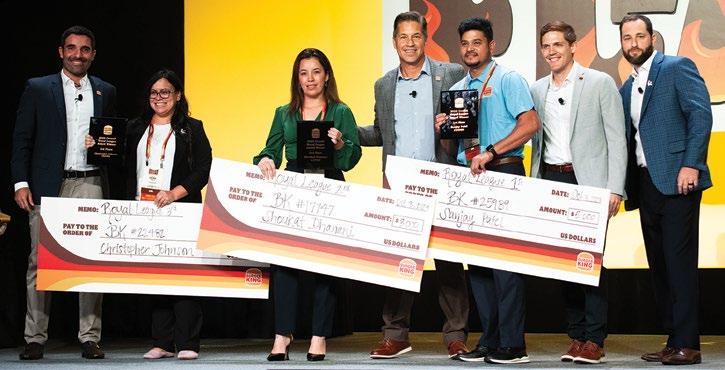




As we approach the end of another remarkable year, we find ourselves reflecting on the journey we’ve shared with you all. Without the support of our dedicated franchisee partners, system vendors, sponsors, legacy supporters, employees and restaurant guests, the Foundation would not be able to continue to do the work that we do.
We started 2023 strong, building momentum throughout the year by presenting at Road Show and Royal Royal Round Tables, holding our signature events, activating inrestaurant campaigns, and finishing out the year by raising over $1.4 million at the Burger King® US&C Convention in Miami, Florida!
To our franchise partners, thank you for bringing the mission of the Foundation to customers at the register. With your support, we raised more than $4.1 million through the Donation Box Program, Round-Up Campaigns and Fall Coupon Fundraiser.
To our Board of Directors, thank you for propelling our initiatives forward and shaping the Foundation’s path. As advocates for the Foundation, you embody Jim McLamore’s spirit of giving, with your support extending far beyond the boardroom.


To our sponsors and system vendor partners, thank you for believing in the mission of the Foundation’s programs through your sponsorships, event attendance, gift-in-kind donations and media support.
To our legacy supporters, thank you for empowering potential for aspiring students by making a lasting impact. You are impacting tomorrow’s scholars and lighting the way for future generations.
A special congratulations to Tom McDonald, President of Glencoe Management, for being named 2023 King of Giving! Tom is a shining example of what it means to champion education and emergency relief and support the Foundation in his community and beyond.
From the entire Burger King℠ Foundation team, thank you! Thank you for supporting us as we continue our mission of creating brighter futures by empowering individuals and feeding potential through education and emergency relief.










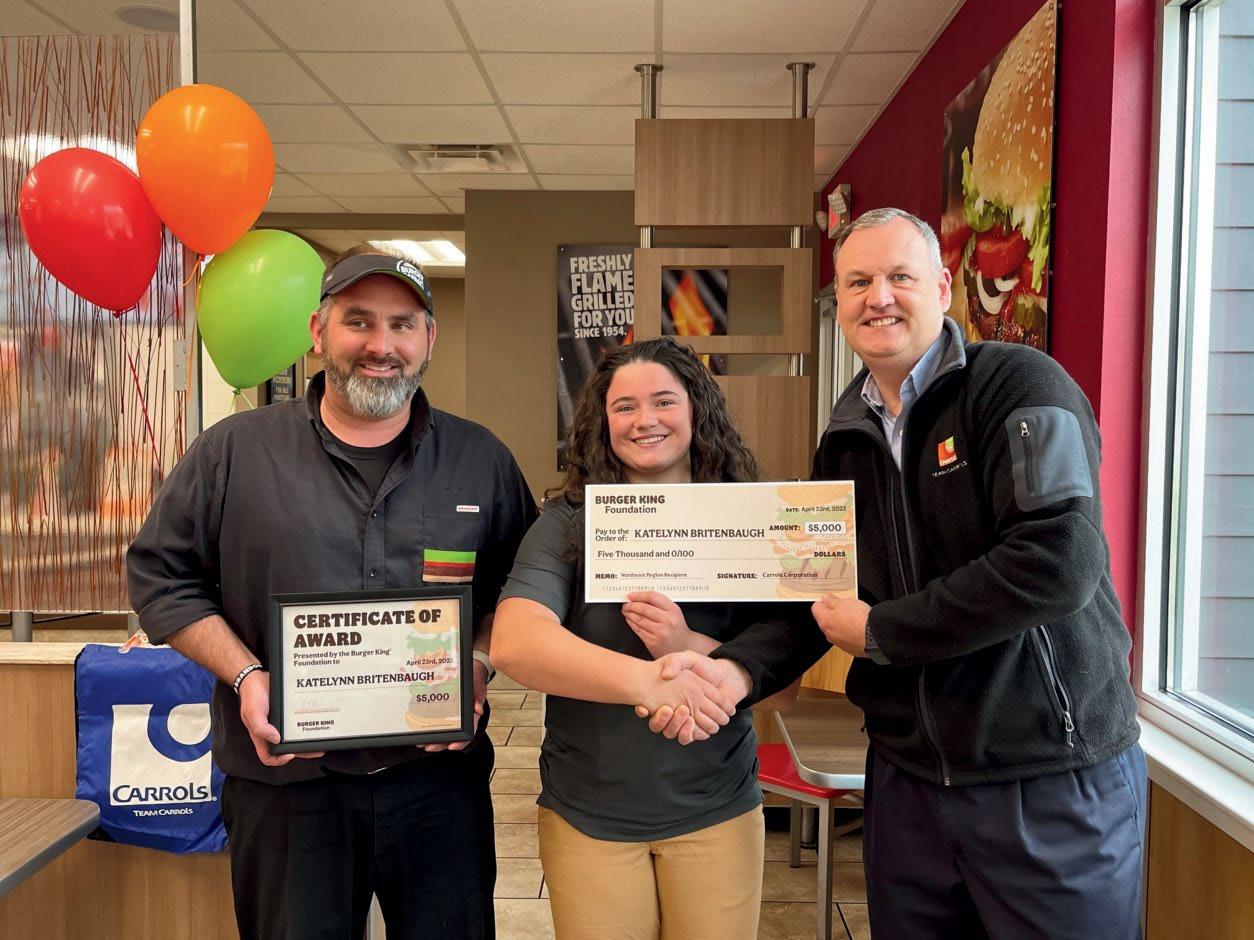







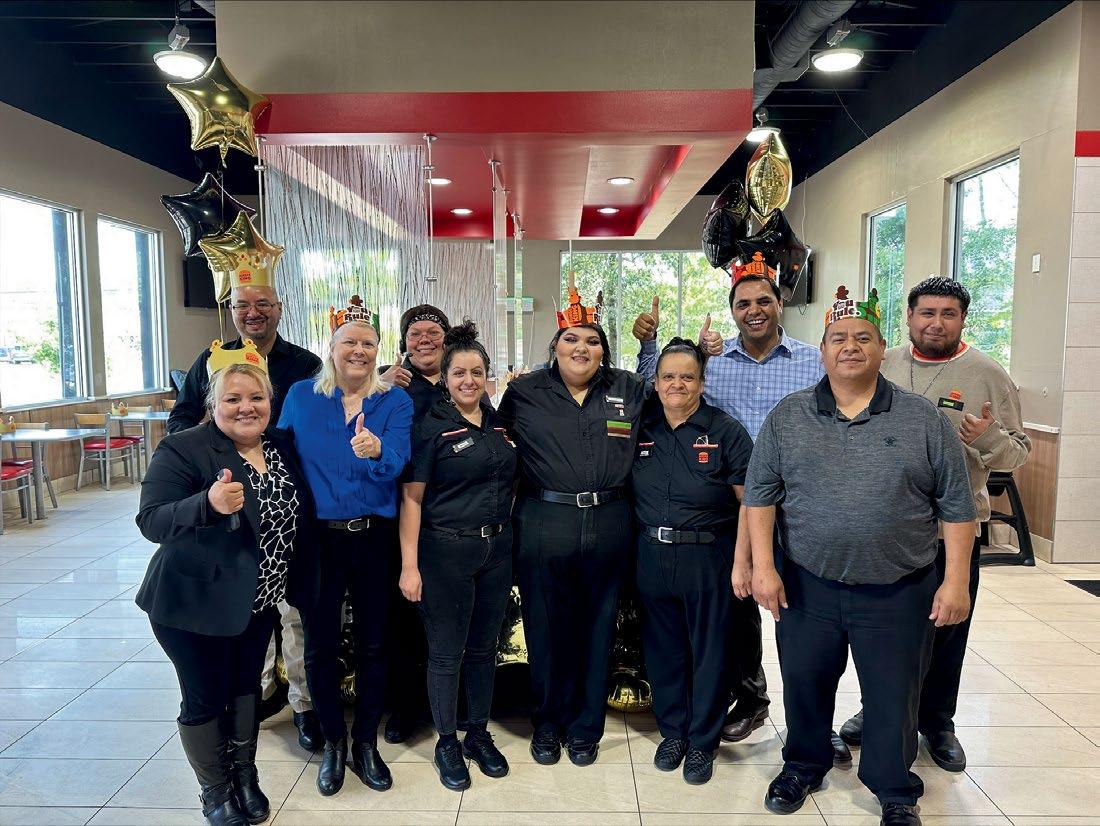





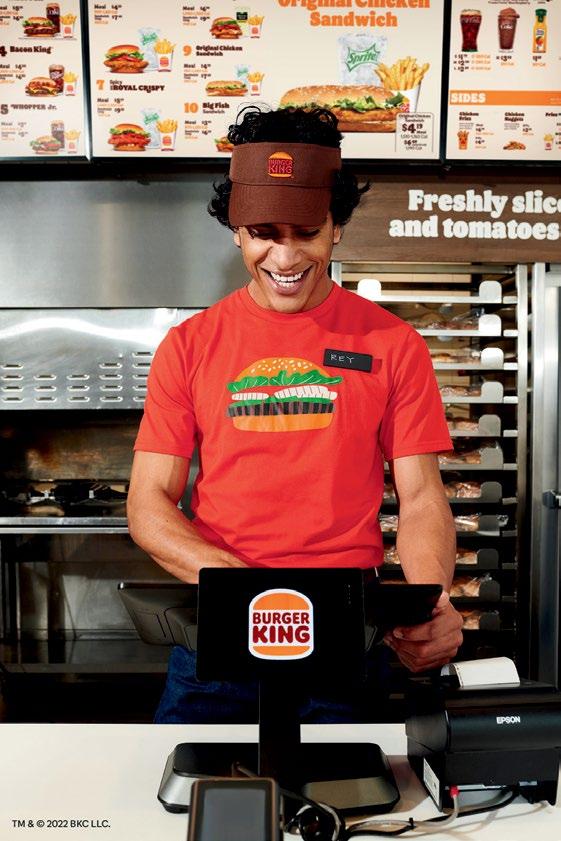



The labor issues wreaking havoc in 2023 have laid the foundation of the restaurant industry for years to come. High inflation, rising costs and a wilting labor market have caused restauranteurs and restaurant brands to pour resources into innovative technology and artificial intelligence (AI) to make up for where human capital falls.
With innovation taking the industry by storm, is technology the solution to the labor crisis?
The COVID-19 pandemic instigated an unpredictable three years for recruiting and maintaining employees, with many not returning to their previous positions.
Many restaurant workers transitioned into alternative industries offering greater security or benefits. Others pursued job training, education or started new careers in professional fields. Among those who returned to the restaurant industry, some opted out due to pandemic-era challenges, including staff shortages, reduced hours and lower tips.
According to the Bureau of Labor Statistics, five million restaurant workers left the industry in March and April 2020.
Fast forward to December 2023, the situation has improved notably but with obstacles yet to come. With recent legislation, such as the Food Accountability and Standards Recovery (FAST) Act, COVID-19 repercussions and economic downturn, many
restaurant operators are forced to find solutions to maintain operations at a lower cost.
“Labor shortages, high turnover rates, lowered educational requirements and the need for specialized skills are becoming increasingly rare in the emerging workforce,” BURGER KING® franchisee Jordan Drury said. “With bottom lines continuing to decline, businesses simply cannot afford to be 100% beholden to the American workforce.”
 by JARED JOHNSEN
by JARED JOHNSEN
According to QSR Magazine, the restaurant industry has over one million positions available.
Advanced technologies, such as kiosks, robots and AI, are teed up to try to stabilize the labor market. As manufacturing and operating costs for this equipment decrease and innovate year after year, technology is a compelling option to use for labor. Programmed robots don’t need days off, cannot quit and do not steal. They can also perform the same task they are assigned to perfectly do each time, often faster than a person can.
“Machines can perform tasks with a higher degree of precision and consistency,” Drury said. “In an industry where mistakes are punished fairly severely with a guest simply not returning, reducing
errors and improving the quality of our product is a pretty high bar that we all aspire to, but, with people, it’s not that easy.”
Conceptually, replacing human capital with this technology can seem like an obvious choice, but there can be too much of a good thing. For Drury, converting all his workers to robots could damage the hospitality his restaurants provide to his customers.
“While technology and digital ordering methods are becoming more prevalent in the fast-food industry, the personal touch of face-to-face interaction remains an integral part of the dining experience at BURGER KING,” Drury said. “It adds a human element that complements the food and ambiance, contributing to our brand's reputation and our guest's satisfaction.”
Some patrons stand by the old-fashioned way. Although AI will be implemented to reduce human error, technology has bugs of its own. For example, the speech recognition software that some brands are planning to implement is only 84% accurate. Humans are no better at times but are often able to turn around customer situations. However, once technology fails, that raises many concerning points for restaurant owners and operators, wondering how long advanced equipment like this takes to be repaired, who will be there to do it and the potential damaging effects on restaurant operations.
Even though robots are not front-facing and cannot solve complex customer situations, Drury believes they potentially have a purpose in late-night operations.
“As many BURGER KING franchisees know, finding people and keeping a restaurant staffed and open past 11 p.m., can be a real challenge,” Drury said. “With automation, this could be the answer to not only late-night hours but 24-hour restaurants as well. Tech can allow for continuous operations without the constraints of regular staffing, call-offs and poor service during these nonconventional dayparts.”
Some major industry competitors, such as Wendy’s, have already invested millions of dollars to help automate their makeline for the near future. Last year, Wendy’s unveiled its partnerships with various tech companies to innovate the industry with automated drive-thru ordering and underground digital order delivery in the coming years.
With 35% of restaurant chains hoping to utilize AI within the next year to improve their business operations, BURGER KING has been vigilant in implementing new technology to help automate its workforce and testing new technologies in certain markets across the U.S.
All-in-all, the present-day challenges of running a restaurant franchise are driving operators to invest heavily in restaurant technology. If labor issues persist, they could potentially hurt many operators. Thankfully, help is within metallic reach.
“In the next 15 years, I believe we will see a complete shift in entry-level jobs such as fast food and retail,” Drury said. “This shift will be primarily to AI, robotics and self-checkout. Our current labor force will be largely eliminated aside from one or two people in the restaurants to manage machines. This will cause a massive shift in political policy, and as QSR is the largest employer in our country, it will change the workforce in the U.S. We are on the cusp of another industrial revolution, and it will be centered around automation.”
JARED JOHNSEN is the communications specialist for NFA. You may reach Johnsen at 678-439-2291 or jaredj@nfabk.org.



The first issue of Flame magazine was published by National Franchisee Association (NFA) in 1990. Since then, Flame has become a staple among NFA members, vendor partners and even leaders at BURGER KING® Corp. (BKC). The long-established reputation of the magazine is a testament to the value that Flame provides, offering important connections throughout the BURGER KING system and chronicling the history of our association.
For the last look at NFA’s 35-year history, we are recapping 35 Flame covers from years past. Cheers to many more editions of NFA’s iconic publication!
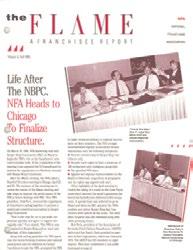
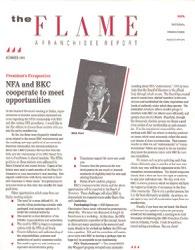

Fall, 1990
The Fall 1990 issue of Flame recapped NFA’s meeting with BURGER KING Corp. After the meeting, the NFA Board of Directors met to finalize the NFA Committee structure. The new committee structure was then listed, along with updates from the committees.
Spring, 1991
This issue of the Flame provided insight into the first organized NFA meeting in Coral Gables, Florida, where Barry Gibbons, BKC CEO, discussed plans to elevate BURGER KING and its marketing. This issue also published the agenda for NFA’s next meeting in May of that year.
Fall, 1992
BKC CEO Barry Gibbons once again met with the NFA Board of Directors in October of 1992 to share his future goals for the company surrounding restaurant growth and sales. NFA members also attended a congressional hearing called “Franchisee Perspectives on Contemporary Franchising” where franchisee and NFA member Allen Rogers presented a testimony.

Summer, 1993
Franchisee and NFA member Marvin Schuster was interviewed for the feature story in this issue of the Flame. The article particularly focused on Schuster’s success with the localized breakfast program he tailored to work for his restaurants. The issue also published the agenda details for NFA’s first Annual Convention in September of that year.
 by ALLISON MCCALLUM
by ALLISON MCCALLUM


Winter, 1993
The Flame editorial staff interviewed BKC COO James Adamson, focusing on his primary goals in the position. NFA member and franchisee Doug Day was interviewed on his experience with the WHOPPER® Hopper, a burger-shaped inflatable for children that debuted in the 1980s.
Winter, 1994
The cover story featured photos of a recently remodeled Atlanta restaurant, meant to reflect the brand’s “new image.” This issue also introduced new NFA Board members, including Jim Froio who has been a franchisee in the BK® system since 1986, and touched on a number of franchisees affected by an earthquake in California.


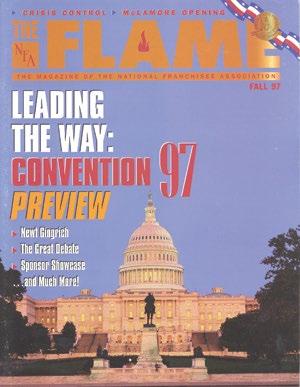
Fall, 1995
This issue of the Flame shared details of the third NFA Annual Convention in Orlando, Florida, where Jim McLamore would be in attendance, along with BKC leadership for the first time. Another story featured new iterations of BURGER KING playgrounds, including larger updated sets and indoor versions.
Fall, 1996
Founder Jim McLamore passed away in late summer of 1996. This issue took a focus on McLamore’s life and legacy and his countless contributions to the brand. In 1996, NFA membership opened to Canadian franchisees, officially welcoming them to the association.
Fall, 1997
The Flame editorial staff interviewed BKC’s newly hired Vice President of Public Relations and Communications, Robert Doughty, about his approach to crisis management. NFA also previewed the 1997 NFA Annual Convention, the first time NFA took a national event to Washington, D.C. Rep. Newt Gingrich was the convention’s keynote speaker.
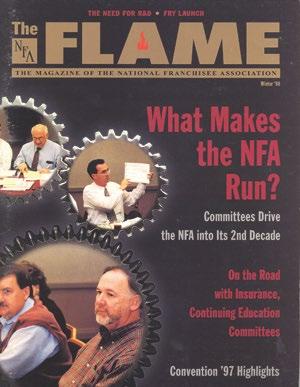
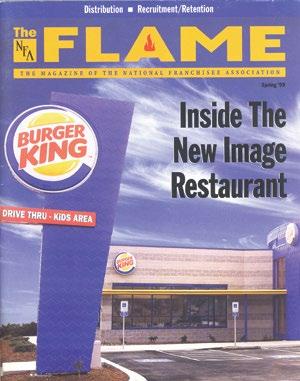
Winter, 1998
NFA Chair Mike DeRosa visited New York City for BURGER KING’s new fry launch, where the “fry mobile” made its first stop as it traveled across the country handing out free BK French fries. This issue also highlighted NFA’s committee structure and took an in-depth look at how they operate.
Spring, 1999
After BKC finalized new image plans for BURGER KING restaurants, called “Have it Your Way,” NFA visited a newly renovated restaurant in Reno, Nevada, owned by NFA members Barbara White and George and Diane Sorrentino. The new look boosted the store’s sales by 40%. Restaurant Services Inc. (RSI) unveiled a new distribution strategy to better address localized needs.

Spring, 2000
NFA Chair Steve Lewis announced NFA’s Project Champion at the 2000 NFA Annual Convention. NFA Vice Chair Julian Josephson and Lewis met with Diageo to express their growing concern about brand and Project Champion plans. Also featured in this issue of Flame are the very first winners of the BURGER KING Foundation’s scholarship program.


Winter, 2001
The Flame interviewed Marketing Advisory Council (MAC) co-chairmen Dan Fitzpatrick and Joe Mirabile about BURGER KING’s new marketing direction, a collaborative effort between the MAC and BKC. President of BKC North America, Mikel Durham, also sat down for an interview.
Winter/Spring, 2002
With Project Champion close to complete, NFA made plans to celebrate at the 2002 convention, themed “Champions of Pride.” This would be the largest trade show an NFA event had seen since the inception of the NFA Annual Convention. This issue also highlighted the new officers on the board, notably Julian Josephson as chair and Dan Fitzpatrick as vice chair.

Fall, 2003
This issue of the Flame highlighted franchisees Beth and Ed Westfall in North Carolina. Franchisees since 1983, they spent 30+ years in the business. Another notable story is a recap of the 11th NFA Annual Convention in Dallas.
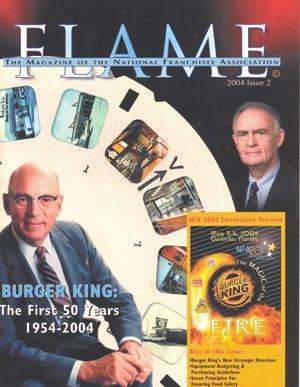
Spring, 2004
In 2004, BURGER KING celebrated its 50th anniversary. To celebrate, the Flame put together an extensive timeline of significant events in the brand’s history. Founder Dave Edgerton sat down for an interview with the editorial staff, recalling the beginning of the brand and how he drew the original King in the BK logo. NFA member services started to see a large expansion, laying the foundation for what is now Elevanta.
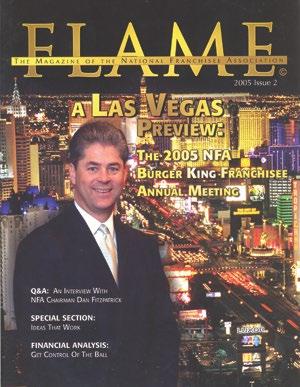
Spring, 2005
Highlighting NFA’s legacy of advocacy, Flame recapped 10 of NFA’s top achievements since its formation, including the establishment of RSI, the completion of Project Champion and the formation of NFA committees that work with BKC, all of which still exist today. NFA Chair Dan Fitzpatrick also checked in after his first few months as the new chair.

Winter, 2006
Celebrating the formation of NFA’s Government Relations Committee in 2006, this issue of the Flame recapped the inaugural Government Relations Conference, now called NFA Day on the Hill. That year, Rep. Rick Keller of Florida won the first King of the Hill award. This issue also unveiled RSI’s new online resource, the P&L Benchmark Model.
Continued on page 28
Continued from page 27


Spring, 2007
Many NFA members have turned their BURGER KING business into a family legacy. This issue highlighted some of these families, including the Kostel family, the Cook family, the Cammilleri family, the Novak family and the Barto family. NFA also celebrated the 15th NFA Annual Meeting.
Fall, 2008
Flame magazine celebrated NFA’s 20th anniversary in 2008. To commemorate, the magazine republished the Spring 1990 issue of Flame. Other anniversary stories included a feature on women of the NFA, a recap of the NFA-RSI meeting and a feature on Valerie Daniels-Carter who won the Humanitarian Award for her charitable efforts in the U.S. and abroad.
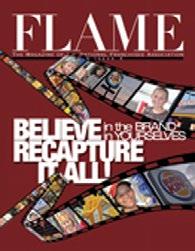


Fall, 2009
BURGER KING franchise EDN Inc. was highlighted for their philanthropic efforts in this issue of the Flame. Beginning in 1982, the franchise partnered with local schools in their community to make a difference for students. Herman Cain contributed a piece on government-mandated health care.
Fall, 2010
This issue of the Flame focused on government relations and franchisee advocacy. Several franchisees shared their personal stories of advocacy and political activism — like franchisee Eric Oppenheim, who participated on a panel at the U.S. Chamber of Commerce event in July 2010.
Winter, 2011
Franchisee Bill Spence was celebrated as a “BURGER KING icon” in a feature detailing his 44-year journey of success and devotion to the brand. Several key moments from the 2011 NFA/BKC Summit in Washington, D.C., were also highlighted in this issue, including members of the NFA being invited to President Obama’s joint session speech to Congress the same week as the BKC Summit.

Spring, 2012
In this issue, NFA saluted 14 strong and distinguished “Wonder Women” franchisees for their contributions to the BURGER KING brand, their companies, employees, communities and families. RSI also listed the top 20 accomplishments made by the company in their efforts to support its members and BURGER KING system initiatives between Sept. 2010 and Sept. 2011.

Fall, 2013
Flame celebrated the beginnings of the BURGER KING brand in this issue by telling the stories of how the first generation of franchisees found their way into the business, like Mary Murphy and Bob Furman, who started opening restaurants in 1959. This issue also highlighted franchisees who made a significant mark in their communities through the power of the BURGER KING Scholars program.
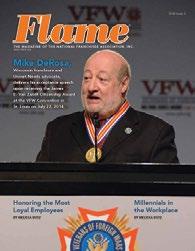
Fall, 2014
PEC Management in Erie, Pennsylvania, celebrated the 15-year anniversary of the BURGER KING Amphitheater. Wisconsin franchisee and strong advocate for the Veterans of Foreign Wars’ Unmet Needs program, Mike DeRosa, was also presented with the James E. Van Zandt Citizenship Award, a prestigious recognition given to recipients including several past Presidents.
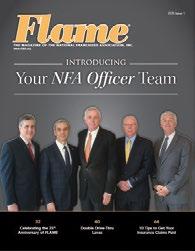

Spring, 2015
2015 marked the 25th anniversary of Flame magazine with a feature showcasing every existing cover since the publication’s debut in Spring 1990. This issue also included an introduction to the newest members of the NFA Board of Directors, as well as interviews with the NFA Officer Team.
Winter, 2016
NFA gathered in Orlando, Florida, for its 2016 Annual Meeting, which coincided with the BURGER KING Global Convention. This issue of Flame included a feature on NFA members who were recognized during the Annual Meeting for celebrating milestone anniversaries with BURGER KING, as well as their continued hard work and dedication.
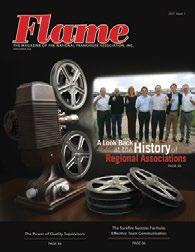
Spring, 2017
In this issue, Flame detailed the birth and transformation of regional associations, which have helped franchisees aid each other in navigating the BURGER KING brand. The BURGER KING McLamoreSM Foundation (BKMF) canister program was relaunched to grow scholarship opportunities in more than 1,000 communities.

Spring, 2018
2018 marked the 30th anniversary of National Franchisee Association, so the Flame looked at the NFA’s biggest accomplishments and important dates in the association’s history. The BKMF also contributed an interview with two members of the BKMF Board of Directors, David Harper and Chris Johnson.
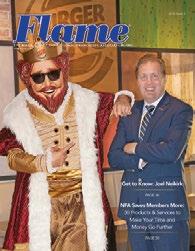
Summer, 2018
This issue of the Flame featured a story on Joel Neikirk’s journey to being named chair of the Restaurant Services Inc. (RSI) board, as well as his involvement with the BK system and embodiment of the NFA’s core values. The BKMF was also awarded the National Restaurant Association’s Restaurant Neighbor Award for Community Service.
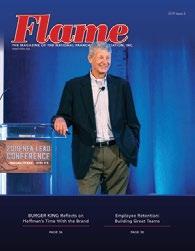
Summer, 2019
In 2019, the Flame reflected on George Hoffman’s 35 years of service to the BURGER KING brand and RSI ahead of his retirement in September of that year. Also, in a first for the NFA community, over 500 franchisees, system suppliers and above-restaurant leaders came together in Dallas, Texas, for the 2019 NFA Leadership Exploration and Development (LEAD) Conference.
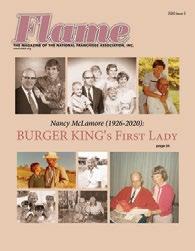
Summer, 2020
Nancy McLamore, wife of BURGER KING co-founder Jim McLamore, passed away in May of 2023 at the age of 93. In this issue of the Flame, her journey as “BURGER KING’s First Lady” was highlighted, including details of her many contributions to the business and the support system she provided for her husband while he built the brand.

Summer, 2021
The Flame honored Rod Martin, a nearly 50-year veteran franchisee of the BURGER KING system, after his sudden passing from cancer in March of 2021. The cover featured a photograph of Martin on an RSI business trip to China, leaning off the side of the Macau Tower. Another notable feature detailed the 2021 NFA LEAD Conference, which brought franchisees and system suppliers together face-to-face for the first time in a year.

In 2022, the WHOPPER turned 65. This issue of the Flame included a feature revisiting the many variations of the WHOPPER to hit stores throughout the famous sandwich’s history, including delectable creations like the Fiesta WHOPPER in 1998, the Pizza WHOPPER in 2009, the Ghost Pepper WHOPPER in 2022 and more. This issue also honored the life of notable RSI Chairman, Mike Novak, who worked for 32 years in the BURGER KING system, owning and operating 14 BK restaurants throughout his time as a franchisee. n
ALLISON MCCALLUM is the communications editor for NFA. You may reach McCallum at allisonm@nfabk.org or call 678-797-5165.



In today’s interconnected world, email remains the backbone of corporate communication. For this reason, the implementation of Multi-Factor Authentication (MFA) for email is not a luxury, but a necessity for businesses. With cyber threats on the rise, the traditional username and password approach is no longer enough to secure access to corporate resources. Here are several reasons why email MFA is an essential safeguard for businesses.
 by BRUCE AHRENDT
by BRUCE AHRENDT
Tyson Foodservice is proud to have partnered with Burger King® for over 40 years on menu breakthroughs like the Royal Crispy Sandwich, the Original Chicken Sandwich, Chicken Nuggets and Original Chicken Fries. We’ve also teamed up on LTO innovations including Ghost Pepper Nuggets, Jalapeño Chicken Fries and this year’s boldly-seasoned Spicy Chicken Fries. It’s an honor to join with Burger King® supplying high-quality products and collaborative innovation along the way.



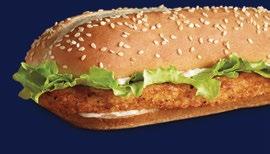
Phishing attacks and credential theft pose significant risk to business email. These attacks trick users into revealing login credentials thus allowing unauthorized access to email accounts, known as Business Email Compromise. Once such access is attained, the bad actor can replay email threads to internal and external targets to extend the attack and potentially compromise other accounts or execute attack methods such as payment fraud. MFA adds a layer to authentication security, making such breaches more challenging for attackers. According to the 2023 IBM X-Force Threat Intelligence Index, 41% of breaches identified phishing as the initial attack vector.
Insider threats, whether intentional or inadvertent, can be as damaging as external hacks. MFA provides a critical line of defense,
ensuring that email access requires multi-layer authentication. This can be a deterrent even when credentials are known internally. Beyond email, applying MFA to privileged system accounts, for example, those that can manage your corporate domain, is another effective control to reduce the severity of a cyber incident.
People tend to reuse passwords on multiple Internet sites. As breaches occur in common social media or entertainment services, a password that has been used widely may be exposed. The proliferation of automated tools that perform brute-force attacks on passwords, or may use known exposed credentials, necessitates MFA. This added layer of security discourages attackers, often leading them to target less secure systems.
The impact of a security breach can lead to supply-chain disruptions, restaurant closures and financial damage. We work in an interconnected system of the brand, franchisees, suppliers and other supply-chain partners, where a breach in one entity can affect the entire system. We must each do our part to reduce cyber risks.
We work in an interconnected system of the brand, franchisees, suppliers and other supply-chain partners, where a breach in one entity can affect the entire system.
Discuss email MFA with the team that manages your email system. Most online providers, such as Microsoft and Google, provide free tools to support MFA when configuring email on new devices. n
BRUCE AHRENDT is the senior manager, Information Security and Risk Management for Restaurant Services Inc. Promoting Cyber Security Awareness throughout our BK® supply-chain is essential to protecting our brand, members and stakeholders.










Relations
On August 2, 2023, the National Labor Relations Board (NLRB) issued its decision in Stericycle Inc., in which it articulated its new standard for evaluating whether employer work rules are impermissible under the National Labor Relations Act (NLRA). In doing so, the NLRB overturned the standard for evaluation of work rules set forth in two Trump-era NLRB decisions, Boeing Co. (2017) and LA Specialty Produce Co. (2019). The Stericycle standard harkens back to the NLRB’s standard for evaluation of work rules prior to the Boeing Co. decision, adopted in its Lutheran Heritage decision in 2004. The new standard applies equally to both union and non-union employers.
Under the Stericycle standard, the NLRB will deem a work rule to be unlawful if an employee could reasonably interpret the rule as having a coercive meaning or limit the exercise of their rights under Section 7 of the NLRA. To determine this, the NLRB will assess “the specific wording of the rule, the specific industry and workplace context in which it is maintained, the specific employer interests it may advance and the specific statutory rights it may infringe” to determine if the rule has a “reasonable tendency” to chill employees’ exercise of their Section 7 rights. Significantly, the NLRB will not consider the employer’s intent in its analysis. Under this standard, work rules must be narrowly tailored to “advance legitimate and substantial business interests,” and cannot have the potential to interfere with employees’ right to engage in protected concerted activity.
While the Stericycle decision provides little guidance as to how this standard will be applied in practice, employers can still take
steps to limit the risk of challenges to their work rules and are urged to do so as soon as possible. Employers must construct their work rules as narrowly as possible and avoid using language which could be interpreted as infringing upon employees’ Section 7 rights. Employers should also review existing work rules to determine whether they may be deemed unreasonable under this new standard, and if any revisions are needed.
 by ELIZABETH RICE
by ELIZABETH RICE
Please do not hesitate to contact Laner Muchin with questions on the Stericycle standard or to have your work rules reviewed for compliance. n

Laner Muchin is a firm that specializes in employment-related litigation, labor relations, employment law counseling, employee benefits, executive compensation and business immigration matters. The firm may be reached at www.lanermuchin.com or (312) 467-9800.



Idon’t like to shop. Clothes shopping, grocery shopping, car shopping … it doesn’t matter – I don’t like it. I want to get in, get what I want (fast) and get out. That’s my strategy when I must shop. Two recent shopping experiences, however, were pleasant surprises. Both experiences showcased customer service at its best and at its most simple. Once again, I was reminded that great service isn’t about grand acts, it’s about common courtesy, artfully delivered.
The first story took place the day before a speaking engagement in Chicago. I needed to buy a pair of dress shoes because I had forgotten mine at home in Florida. I found myself in a store called the Walking Company in a Chicago mall. A friend once told me that it was a good store. It was crowded, so I almost left. But one of the salespeople made eye contact with me. It wasn’t the kind of eye contact that said, “Oh no, another customer.” Instead, it was eye contact that said, “I know you’re there, and I’ll be right with you.” It was good eye contact. I browsed around for a couple of minutes and found a pair of shoes I liked.
Sure enough, the salesperson was right next to me, and she said, “Sorry about the wait, let’s get you some shoes.”
I showed her the pair I was interested in and asked her to try a size ten.
She said, “Let’s measure your foot just to make sure.” I know that I wear a size 10, but her whole demeanor showed that she
wanted to make sure I got the right shoes. She was a professional.
She measured my foot and said, “Size 10 is right, but you have a very ‘Reubenesque’ foot.” I didn’t know what that meant, but she sure seemed to know what she was talking about.
“I’ve got to tell you, the type of shoe you’ve selected won’t be the most comfortable for you. I think this other style would feel much better.”
 by DENNIS SNOW
by DENNIS SNOW
Being the skeptic that I am, I looked at the price of her suggested shoes to see how much she was upselling me. Same price. Hmm. With nothing to lose, I tried on the style she suggested, and they were extremely comfortable. Enough time has passed since buying the shoes that any psychological effect has passed – they are truly the most comfortable pair of dress shoes I’ve ever owned, and I wear them all the time.
As I paid for the shoes, the salesperson continued to wow me. She said, “If you ever buy a pair of shoes somewhere else, and I don’t know why you would, be sure to tell the salesperson that the arches in your foot have fallen just a little, and you need shoes with some arch support – just like these.”
When I get good service like this, I want to keep a good thing going. I asked her if there is a Walking Company in Orlando, where
I live, to which she answered yes. I thanked her (sincerely) and left. Since then, I’ve purchased three more pairs of shoes at the Orlando Walking Company, each time with great service and incredibly comfortable shoes. I can’t imagine buying shoes anywhere else, and I’ve sent plenty of friends there.
Now, let’s look at what this Walking Company salesperson did that turned this into a great shopping experience. I’ll analyze the details in a moment, but one word sums up her style – professional. This lady was a professional in every sense of the word. Her skills would apply anywhere. The skills that she demonstrated are as applicable to a bank, hospital, restaurant or law office as they are to a shoe store. Here are four universal traits of a professional in any customer-facing profession:
When I entered the store, the salesperson made immediate eye contact with me. It was sincere eye contact – the kind of eye contact that would’ve made me feel guilty had I just turned around and left. It was eye contact that said she knew I was there and cared that I was there. And as soon as she was finished with her customer, she came right over to help me and apologized for the wait.
The store was busy. But I noticed that everyone was being helped. The salespeople had mastered the art of handling more than one customer at a time while making each customer feel like he/she was the only one. None of the salespeople looked frantic, they just looked responsive.
2 Professionals are knowledgeable.
This salesperson knew about shoes. On the other hand, I know nothing about shoes other than they’re brown or black.

Seeing that this was the case, she took charge of the situation and made sure that I was getting a pair of shoes that were right for me. I benefited from the knowledge that she had.
There is an art to sharing knowledge, I admit. Some customers may say, “I wear a size 10, I know what I want. Just get it for me.” By spending a moment talking to me, however, it was obvious that I was flexible. She was able to be at her professional best and recommended a pair of shoes that were better for me than the ones I had chosen. Professionals read the situation and adapt to the knowledge of the customer. With a couple of well-asked questions, there’s no reason that an employee can’t determine the level of knowledge a customer has. The employee can then best determine how to add value.
Of course, all of this means knowing your product. Professionals are in constant learning mode about their products and their customers. The only way that the Walking Company salesperson could steer me to the right pair of shoes was by knowing shoes and feet. Professionals know their stuff.
My Walking Company salesperson could have easily brought me the pair of shoes I originally asked for. But she wasn’t selling shoes – she was selling shoes that were right for me. That’s a big difference. Professionals aren’t happy just selling a product or service. They want it to be the right product or service for the customer.

She took a few moments to measure my foot and to check my type of foot (Reubenesque!). When she got me that pair of shoes, she knew they would be comfortable for me. Rather than bringing
Continue on page 36

Continued from page 35
out two or three pairs until I found a pair I liked, she brought me one pair – the right pair. Truly caring is smart, and in this case saved the salesperson time. Professionals care.
4Professionals teach you something.
I left the Walking Company with more knowledge than when I walked in. I now know to ask for extra arch support in my shoes. Not a big deal, but I will always remember that salesperson’s advice.
Think of some of your best service experiences; the waiter who made the perfect recommendation, the computer helpdesk that gave you a tip on how to make an application more effective or the clothing store employee who helped you coordinate colors. In most cases of outstanding service, the employee left you better than when he/she found you. You know more than you did before. The new information may not change your life (though it might), but it made your life a tad better.
So, four seemingly small behaviors turned me into a loyal Walking Company customer. The behaviors apply to any service job and can make the difference between a mediocre service experience and an outstanding one. Once again, the behaviors of a service professional are:
1. Professionals are responsive.
2. Professionals are knowledgeable.
3. Professionals care about what they do.
4. Professionals teach you something.
At the beginning of the article, I mentioned that there were two recent shopping experiences that stood out for me. The second experience was while buying a fountain pen. I went to a store called Write On, and the salesperson was a professional who loved fountain pens. He had me write something on a pad so that he could see how much pressure I use while writing in order to recommend the correct pen. He even gave me an instruction sheet that he had personally created for the care of a fountain pen. It was an amazing experience that will definitely bring me back to that store. I sure enjoyed buying that pen.
The behaviors are simple. What’s not simple is the consistent application of the behaviors. Being a true professional takes thought and effort, but once you are a true professional, you can go just about anywhere. The skills are universal, and they are very rare. True professionals stand out from the crowd and grow rewarding and satisfying careers. And the customers of the world know when a true professional is at work. n
DENNIS SNOW is a business author, speaker and consultant who helps organizations develop world-class customer service. He is the author of two books, “Lessons From the Mouse: A Guide for Applying Disney World’s Secrets of Success to Your Organization, Your Career, and Your Life” (DC Press), and “Unleashing Excellence: The Complete Guide to Ultimate Customer Service.” (Wiley). Dennis can be reached at www.snowassociates.com or at (407) 294-1855.

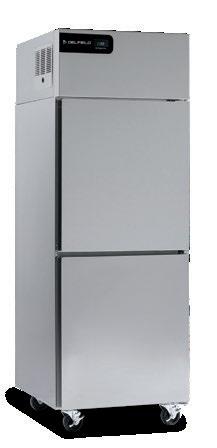

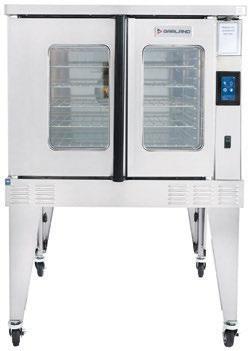

TruOI connects key data systems, automates workflows, provides checklists and forms, and sends real-time alerts. With an integrated Kingboard for location-based insights, TruOI monitors live location scorecards. It optimizes sales, kiosk, delivery, and labor, including SOS goals and guest satisfaction scores. All AI-assisted. Transform your Operations.


a Free Trial at www.TruOI.com/BK

Why do you want to start a particular business? (Purpose)
What is the approach you are going to stay on to make the business successful? (Path)
What are you actually going to do by certain dates to make progress on your path? (Plan)
Essentially, that’s it. No matter how big or small your business enterprise is or becomes, these are the three primary questions to focus on.
Let’s be honest. Being an entrepreneur is hard. It’s hard mentally, physically, socially, financially and emotionally. Many times, you may very well wonder why it’s worth it, and you may come very close to giving up on your venture.
What will keep you going? Your purpose, your reason why you wanted to be in business on your own to start with. Your purpose helps you to maintain the resilience and courage necessary to keep going when your best customers walk away from you, when a great
employee leaves your business and when you are dealing with significant personal challenges.
Take time, lots of time, to clarify the reason why you want to start your own business. This is the crucial first step.
 by DAN COUGHLIN
by DAN COUGHLIN
For me, my purpose is very simple. I wanted to start my own business back in January of 1998 because I wanted to help people succeed. I’ve always gotten an enormous kick out of being a helper, a guide, a teacher and an advisor for other people and watching them achieve something that is meaningful to them.
During the darkest days of The Great Recession from 2008-2010, I was able to keep going despite very few business opportunities because, at the end of the day, I wanted the chance to help other people achieve their goals.
Why do you want to own your own business? Please do not rush through that question. Write your answer down over and over and over until it is either meaningful enough to you to keep you going through the bad times, or you realize that it is not strong enough to start your own business.
While there are many different ways to fulfill your purpose, trying to go down multiple paths at the same time is a recipe for disaster.
Let’s say a person’s purpose is to create meaningful and fun family and friend experiences. So, he opens an indoor pickleball arena. Well, now he must choose a path for his business.
Is he going to focus on opening up as many pickleball locations as he possibly can over the next five years or is he going to focus on making the customer experience at his one location as great as he can make it by being personally involved in trying a variety of ideas in order to see what really sticks with customers?
Either path will require a different usage of his time and energy. Either can be successful. What won’t be successful is trying to go down both paths simultaneously.
Once you have a purpose, lay out what the path is going to look like for your business over the next several years. Once you know the path, then you can make decisions that fit on that path.
A plan, to me, involves a calendar. It means writing down what you are going to do each day and each week and each month to make progress on your path. As you add things to your to-do list, ask yourself if that is the highest and best use of your time to move your business forward on the path you want to be on.

These three ideas (purpose, path and plan) are each very important. The consistent interweaving of these is what allows a business to gain momentum and to build a great brand, great operations and great customer relationships.
However, as time moves on, you may realize that a different path would be more effective. You might possibly change your purpose. And as you change those two, you will have to adjust your plans. Just notice that changing your purpose or path is a very significant thing that is going to have significant ramifications. If you change them, then I encourage you to change them with the attitude that you are going to stick with the new purpose or new path for the long term. Companies with a weak compass constantly change their purpose and path and end up taking their organization on a wild roller-coaster ride that usually does not end well. n

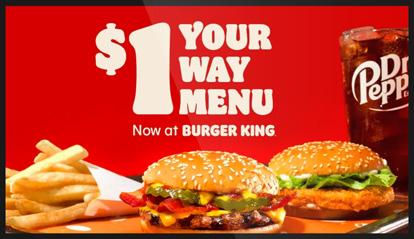
Since 1998, DAN COUGHLIN has worked with serious-minded leaders and executives to consistently deliver excellence. He provides Executive Coaching, Leadership and Executive Development Group Coaching Programs and seminars to improve leadership and management performance. His topics are personal effectiveness, interpersonal effectiveness, leadership, teamwork and management. He also guides strategic decision-making meetings. Now, he is also focused on helping people to develop their entrepreneurial mindset. Visit his free Business Performance Idea Center at www.thecoughlincompany.com.
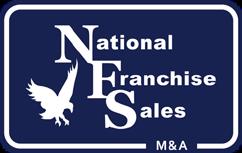



Restaurants can have high risk of insurance claims compared to other industries, especially related to employee injury. According to the most recent data from the U.S. Bureau of Labor Statistics:
• Private industry workers in restaurants incurred 93,800 nonfatal injuries and illnesses in 2019. About one-third of these cases required at least one day away from work.
• Sprains, strains and tears that resulted in days away from work occurred at a rate of 28.9 cases per 10,000 full-time restaurant workers
• 8,110 cases of cuts and lacerations resulted in days away from work, occurring at a rate of 23.6 cases per 10,000 full-time restaurant workers, compared to just 7.1 cases for all private industry workers.
Read on to learn the common injuries restaurant workers face and how your organization can work to implement prevention tactics.
Restaurant workers are particularly vulnerable to injury because:
• They perform repetitive tasks for extended periods of time.
• They work with ovens, fryers, flat-tops and other high-heat equipment.
• They work long hours, where fatigue can cloud judgement.
To help your employees stay healthy, consider these recommendations:
• Host regular employee training that includes injury awareness, workplace inspections, accident response and incident reporting.
• Post housekeeping standards to list the minimum safety requirements at your organization.
• Maintain clear guidelines and responsibilities for all staff members, including owners, managers and employees.
• Implement a reporting program that provides employees with an outlet to share hazards or near-miss incidents they have witnessed.
• Assign annual responsibilities such as inspections and refreshers on seasonal risks.
• Share incident reporting protocol to ensure accidents will be thoroughly investigated and prevented in the future.
Slips, trips and falls are another common type of injury for restaurant employees. As a business owner, you can take proactive steps to prevent your employees from experiencing a slip, trip or fall.
• Remove obstructions: Always clean up spills and wet spots. After the mess has been cleaned up, place a wet floor sign to make others aware. Arrange or remove furniture so there is plenty of room for walking. Always clear your business’s parking lots and sidewalks of snow, ice or debris.
• Improve visibility: Ensure you have good lighting in place. Consider adding task lighting in dim work areas. Illuminate all parking lots, paths and walkways, too. Replace burned out bulbs promptly.
• Safety-proof: Add grab bars next to toilets. Ensure furniture is in good shape. Install non-slip, rubber mats or rugs around sinks, beverage stations and other accident-prone areas.
• Reduce human factors: Require employees to wear slip-resistant footwear during their shifts. Spread out repetitive tasks, such as food preparation, to various workers throughout the day. Require employees to take frequent breaks from repetitive activities.
Your business is responsible for providing a safe environment for your employees. Your business can also be held liable for any incidents that occur on premises, so it is important to secure the right insurance coverage.
By implementing risk management tips, you can help reduce the risks your employees face. However, it is also critical to have the right insurance protection, should an employee get injured.
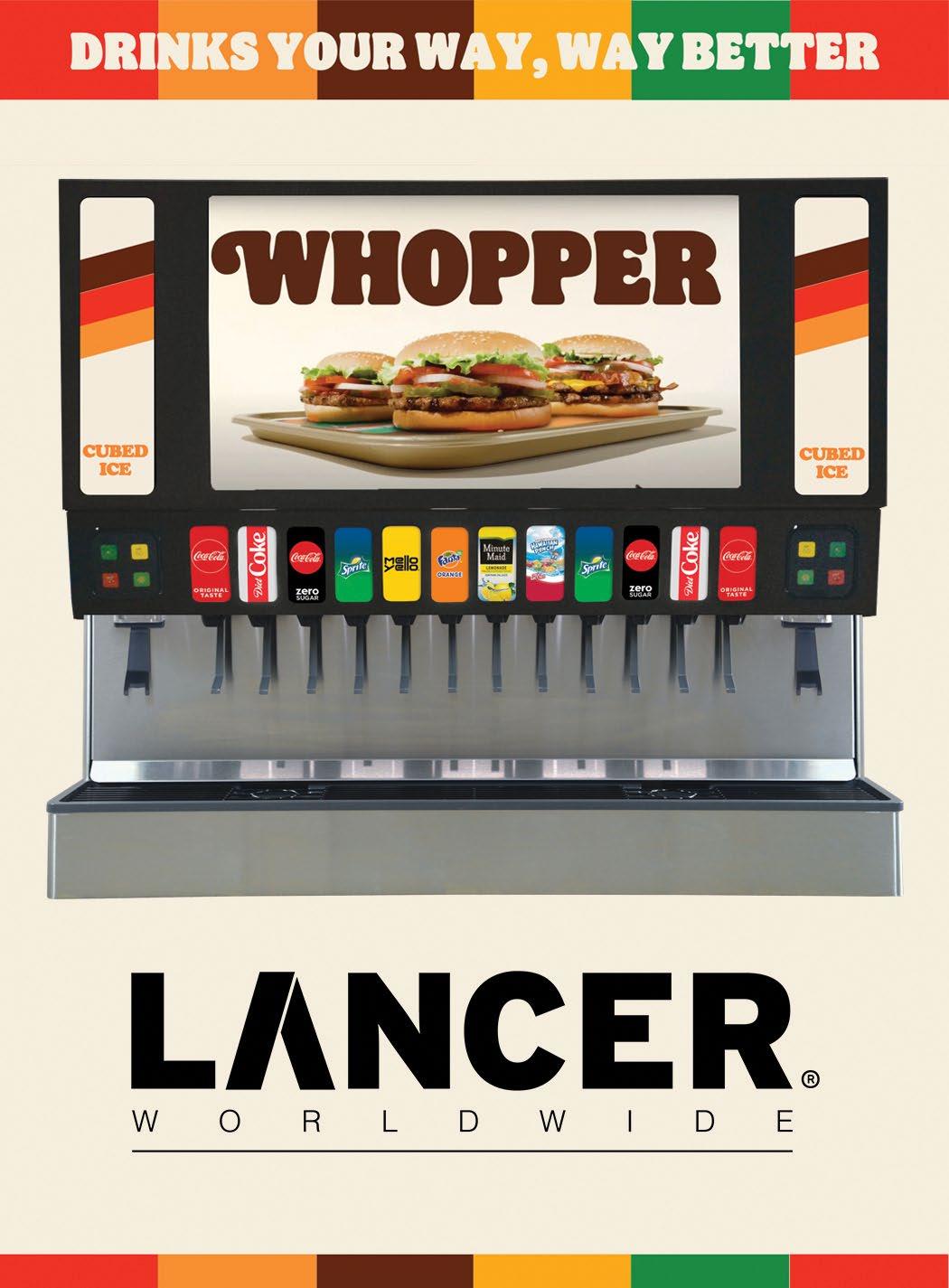
Workers’ Compensation Coverage from Lockton Affinity helps ensure that your employees and their families have a remedy for workplace injuries and that your business is not unduly burdened with costly legal claims from an accident. Workers’ Compensation coverage also protects your business from regulatory actions, which may include costly fines or even criminal charges for noncompliance in some states.
See what this coverage will look like for your business by completing our price indication request at Elevanta.LocktonAffinity.com. It takes less than five minutes. n

The Elevanta Insurance Program is administered by Lockton Affinity, LLC d/b/a Lockton Affinity Insurance Brokers LLC in California #0795478. Coverage is subject to actual policy terms and conditions. Policy benefits are the sole responsibility of the issuing insurance company. Coverage may be provided by an excess/surplus lines insurer which is not licensed by or subject to the supervision of the insurance department of your state of residence. Policy coverage forms and rates may not be subject to regulation by the insurance department of your state of residence. Excess/Surplus lines insurers do not generally participate in state guaranty funds and therefore insureds are not protected by such funds in the event of the insurer’s insolvency. Elevanta will receive a royalty fee for the licensing of its name and trademarks as part of the insurance program offered to the extent permitted by applicable law.






“
To thrive in this new age of hyperchange and growing uncertainty, it is now imperative to learn a new competency — how to accurately anticipate the future.”
- Dan Burrus, Author, business advisor, and futurist
When many people hear the term “New Age,” we think of crystals, magic mushrooms and alternative spirituality. But when applied to business practices, the term takes on a different meaning. There’s some of the esoteric in New Age business, but as it typically does, the business community has extracted only what seems to work. It’s more of a New Age of productivity than a new type of lifestyle. Practitioners of New Age management techniques have chosen logical practices for treating their human resources as, well, more human. Let’s take a look at a few, starting with the obvious.
 by LAURA STACK
by LAURA STACK
Many Westerners have misguided ideas about meditation. Stripped of mysticism, it’s simply a way to relax and clear your mind — a welcome exercise for a desk-bound worker. This allows you better access to the creative and subconscious parts of your mind. If you come up with a new idea or insight during the process, that’s a bonus, and you may end up with more dividends than you expect. It worked for Henry Ford’s famous idea man, whom Ford’s efficiency expert disapproved of until Ford pointed out that the man’s ideas had saved him millions. I won’t teach you how to meditate here; you can find hundreds of resources that do so on the Internet, depending on your intention (it’s not just all about not thinking). When I first tried deep breathing for meditation, I couldn’t stop my mind from going over my to-do list, so now I pray instead to keep my mind focused.
This practice involves paying strict attention to what you’re doing in the moment. While letting yourself run on automatic can increase your productivity, it doesn’t work for everything. I think of it as more peripheral to work than central to it: Routine gets you dressed, through breakfast, to work and into your daily mode, but while you work, mindfulness ensures your focus, reduces mistakes and deepens your effectiveness and understanding of what you’re doing. Running on automatic, you learn little or nothing. Mindfulness is how you improve your work and your work ethic and expand your repertoire. Errors become fewer, your pace more deliberate, efficient and effective. Remember: True productivity lies where efficiency and effectiveness intersect.
This is a point I’ve made repeatedly over the years: Do one thing at a time with your full focus, and you can do it better and faster than if you try to divide your attention with multiple tasks. While workers are arguably improving at multitasking (if only due to the nature of their daily lives), many employers have begun to emphasize it less. Why? Possibly because Millennials and subsequent generations have begun entering the workplace in increasing numbers, with some of the older Millennials having risen to the top by now. Having seen the tech bubble burst, followed by the Great Recession and its effects, these workers are more likely to be self-focused vs. job focused. They still do their jobs, but don’t kill themselves doing so. Ironically, the result is often greater productivity.
A new focus on well-being. Even before COVID-19, companies were becoming more concerned about the health and well-being of their individual employees. Healthy employees are productive employees, and we’ve now come to realize that taking
regular breaks, getting access to natural light, regularly changing posture, the presence of plants and even walking meetings improve employee well-being enough to improve their performance.
New Age workplace practices may sometimes seem a little woo-woo, but the ones we’ve adopted are logical, and they work. n
© 2023 LAURA STACK. Laura Stack, MBA, CSP, CPAE is an award-winning keynote speaker, bestselling author, and noted authority on employee and team productivity. She is the president of The Productivity Pro, Inc., a company dedicated to helping leaders increase workplace performance in high-stress environments. Stack has authored eight books, including FASTER TOGETHER: Accelerating Your Team’s Productivity (Berrett-Koehler 2018). She is a past president of the National Speakers Association, and a member of its exclusive Speaker Hall of Fame (with fewer than 175 members worldwide). Stack’s clients include Cisco Systems, Wal-Mart, and Bank of America, and she has been featured on the CBS Early Show and CNN, and in the New York Times. To have Laura Stack speak at an upcoming meeting or event, call 303-471-7401 or contact us online.
1.























Flame




